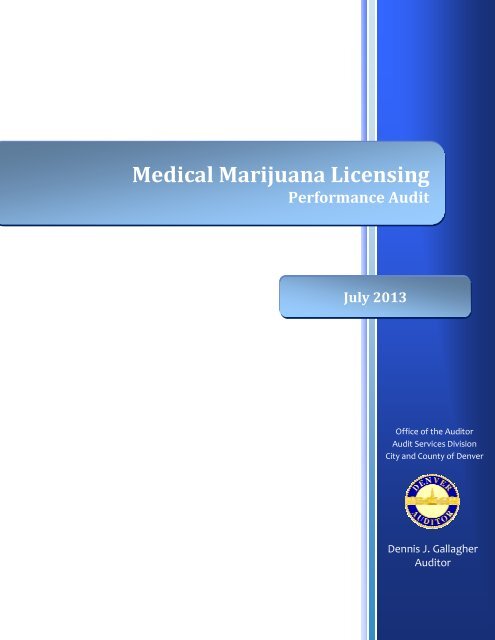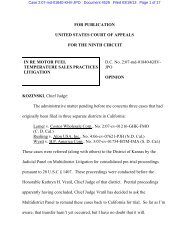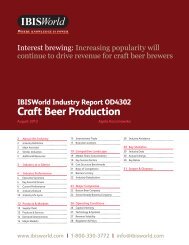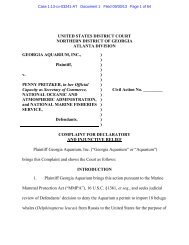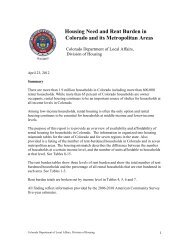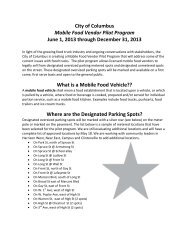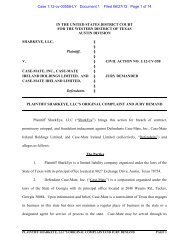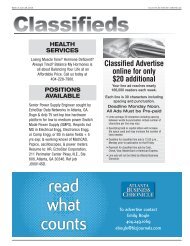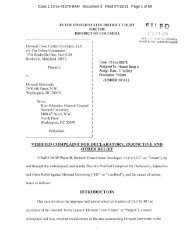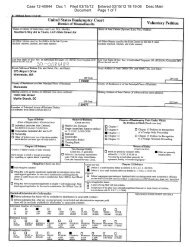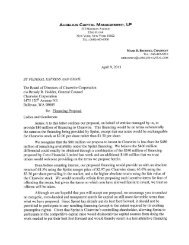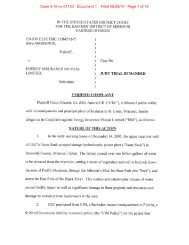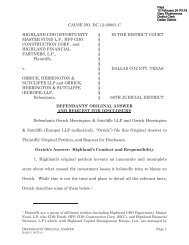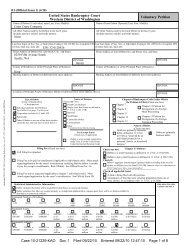Audit - City and County of Denver
Audit - City and County of Denver
Audit - City and County of Denver
You also want an ePaper? Increase the reach of your titles
YUMPU automatically turns print PDFs into web optimized ePapers that Google loves.
Medical Marijuana LicensingPerformance <strong>Audit</strong>July 2013Office <strong>of</strong> the <strong>Audit</strong>or<strong>Audit</strong> Services Division<strong>City</strong> <strong>and</strong> <strong>County</strong> <strong>of</strong> <strong>Denver</strong>Dennis J. Gallagher<strong>Audit</strong>or
The <strong>Audit</strong>or <strong>of</strong> the <strong>City</strong> <strong>and</strong> <strong>County</strong> <strong>of</strong> <strong>Denver</strong> is independently elected by the citizens <strong>of</strong> <strong>Denver</strong>.He is responsible for examining <strong>and</strong> evaluating the operations <strong>of</strong> <strong>City</strong> agencies for the purpose<strong>of</strong> ensuring the proper <strong>and</strong> efficient use <strong>of</strong> <strong>City</strong> resources <strong>and</strong> providing other audit services <strong>and</strong>information to <strong>City</strong> Council, the Mayor <strong>and</strong> the public to improve all aspects <strong>of</strong> <strong>Denver</strong>’sgovernment. He also chairs the <strong>City</strong>’s <strong>Audit</strong> Committee.The <strong>Audit</strong> Committee is chaired by the <strong>Audit</strong>or <strong>and</strong> consists <strong>of</strong> seven members. The <strong>Audit</strong>Committee assists the <strong>Audit</strong>or in his oversight responsibilities <strong>of</strong> the integrity <strong>of</strong> the <strong>City</strong>’s finances<strong>and</strong> operations, including the integrity <strong>of</strong> the <strong>City</strong>’s financial statements. The <strong>Audit</strong> Committee isstructured in a manner that ensures the independent oversight <strong>of</strong> <strong>City</strong> operations, therebyenhancing citizen confidence <strong>and</strong> avoiding any appearance <strong>of</strong> a conflict <strong>of</strong> interest.<strong>Audit</strong> CommitteeDennis Gallagher, ChairMaurice GoodgaineLeslie MitchellRudolfo PayanRobert BishopJeffrey HartTimothy O’Brien, Vice-Chair<strong>Audit</strong> StaffJohn Carlson, Deputy Director, JD, MBA, CIA, CRMAChris Wedor, Internal <strong>Audit</strong> Supervisor, MBANancy Howe, Lead Internal <strong>Audit</strong>or, MPA, CRMAManijeh Taherynia, Senior Internal <strong>Audit</strong>or, CPA, CFE, CRMAKatja Freeman, Senior Internal <strong>Audit</strong>or, MA, MELPYou can obtain copies <strong>of</strong> this report by contacting us at:Office <strong>of</strong> the <strong>Audit</strong>or201 West Colfax Avenue, Department 705 <strong>Denver</strong> CO, 80202(720) 913-5000 Fax (720) 913-5247Or download <strong>and</strong> view an electronic copy by visiting our website at:www.denvergov.org/auditor
<strong>City</strong> <strong>and</strong> <strong>County</strong> <strong>of</strong> <strong>Denver</strong>201 West Colfax Avenue, Department 705 • <strong>Denver</strong>, Colorado 80202 • 720-913-5000 •FAX 720-913-5247 • www.denvergov.org/auditorDennis J. Gallagher<strong>Audit</strong>orJuly 18, 2013Mr. Tom Downey, DirectorDepartment <strong>of</strong> Excise <strong>and</strong> Licenses<strong>City</strong> <strong>and</strong> <strong>County</strong> <strong>of</strong> <strong>Denver</strong>Dear Mr. Downey:Attached is our performance audit <strong>of</strong> the <strong>City</strong>’s medical marijuana licensing process. Thepurpose <strong>of</strong> the audit was to assess the policies <strong>and</strong> practices <strong>of</strong> the Department <strong>of</strong> Excise <strong>and</strong>Licenses’ (Department’s) medical marijuana operations focusing on the associated processes<strong>and</strong> controls <strong>and</strong> their efficiency <strong>and</strong> effectiveness. This audit also included reviewingrecommendations for follow-up from our August 2010 Department <strong>of</strong> Excise <strong>and</strong> LicensesPerformance <strong>Audit</strong>.I would first like to commend you <strong>and</strong> your team for their complete cooperation <strong>and</strong> opennessduring this audit. You <strong>and</strong> your team provided my audit team with full access to information <strong>and</strong>systems allowing for a timely audit. His cooperation is extremely appreciated.With that said, our audit team found that the Department lacks an integrated control frameworkfor licensing medical marijuana businesses. This lack <strong>of</strong> sound controls governing a businessprocess that generates significant revenue is <strong>of</strong> grave concern to me. It is my sincere hope thatyou <strong>and</strong> your team will dedicate a good faith effort in addressing the issues identified throughthis report. This becomes even more important as Colorado enters a new era as it begins theregulation <strong>of</strong> lawful retail marijuana operations.If you have any questions, please call Kip Memmott, Director <strong>of</strong> <strong>Audit</strong> Services, at 720-913-5000.Sincerely,Dennis J. Gallagher<strong>Audit</strong>orcc:Honorable Michael Hancock, MayorHonorable Members <strong>of</strong> <strong>City</strong> CouncilMembers <strong>of</strong> <strong>Audit</strong> CommitteeTo promote open, accountable, efficient <strong>and</strong> effective government by performing impartial reviews <strong>and</strong> other audit servicesthat provide objective <strong>and</strong> useful information to improve decision making by management <strong>and</strong> the people.We will monitor <strong>and</strong> report on recommendations <strong>and</strong> progress towards their implementation.
Ms. Cary Kennedy, Deputy Mayor, Chief Financial OfficerMs. Janice Sinden, Chief <strong>of</strong> StaffMs. Stephanie O’Malley, Deputy Chief <strong>of</strong> StaffMs. Beth Machann, ControllerMr. Doug Friednash, <strong>City</strong> AttorneyMs. Janna Young, <strong>City</strong> Council Executive Staff DirectorMr. L. Michael Henry, Staff Director, Board <strong>of</strong> EthicsMs. Judy Steele, Deputy Director, Department <strong>of</strong> Excise <strong>and</strong> LicensesTo promote open, accountable, efficient <strong>and</strong> effective government by performing impartial reviews <strong>and</strong> other audit servicesthat provide objective <strong>and</strong> useful information to improve decision making by management <strong>and</strong> the people.We will monitor <strong>and</strong> report on recommendations <strong>and</strong> progress towards their implementation.
<strong>City</strong> <strong>and</strong> <strong>County</strong> <strong>of</strong> <strong>Denver</strong>Dennis J. Gallagher<strong>Audit</strong>or201 West Colfax Avenue, Department 705 • <strong>Denver</strong>, Colorado 80202 • 720-913-5000FAX 720-913-5247 • www.denvergov.org/auditorAUDITOR’S REPORTWe have completed an audit <strong>of</strong> the <strong>City</strong>’s medical marijuana licensing process. The purpose <strong>of</strong>the audit was to assess the effectiveness <strong>and</strong> efficiency <strong>of</strong> the Department <strong>of</strong> Excise <strong>and</strong>Licenses’ (Department’s) medical marijuana licensing practices. This audit also includedreviewing recommendations for follow-up from our August 2010 Department <strong>of</strong> Excise <strong>and</strong>Licenses Performance <strong>Audit</strong>.This performance audit is authorized pursuant to the <strong>City</strong> <strong>and</strong> <strong>County</strong> <strong>of</strong> <strong>Denver</strong> Charter, ArticleV, Part 2, Section 1, General Powers <strong>and</strong> Duties <strong>of</strong> <strong>Audit</strong>or, <strong>and</strong> was conducted in accordancewith generally accepted government auditing st<strong>and</strong>ards. Those st<strong>and</strong>ards require that we plan<strong>and</strong> perform the audit to obtain sufficient, appropriate evidence to provide a reasonable basisfor our findings <strong>and</strong> conclusions based on our audit objectives. We believe that the evidenceobtained provides a reasonable basis for our findings <strong>and</strong> conclusions based on our auditobjectives.The audit found that the Department’s medical marijuana licensing practices are inefficient <strong>and</strong>ineffective subjecting the <strong>City</strong> to high risk in a number <strong>of</strong> areas mentioned in this enclosedreport.I would like to commend <strong>and</strong> thank Mr. Downey <strong>and</strong> his team for the full cooperation <strong>and</strong>openness during this engagement. His team provided timely data <strong>and</strong> access to all informationsystems allowing the audit team to complete their work in a timely manner<strong>Audit</strong> Services DivisionKip Memmott, MA, CGAP, CRMADirector <strong>of</strong> <strong>Audit</strong> ServicesTo promote open, accountable, efficient <strong>and</strong> effective government by performing impartial reviews <strong>and</strong> other audit servicesthat provide objective <strong>and</strong> useful information to improve decision making by management <strong>and</strong> the people.We will monitor <strong>and</strong> report on recommendations <strong>and</strong> progress towards their implementation.
<strong>City</strong> <strong>and</strong> <strong>County</strong> <strong>of</strong> <strong>Denver</strong> – Office <strong>of</strong> the <strong>Audit</strong>or<strong>Audit</strong> Services DivisionREPORT HIGHLIGHTSMedical Marijuana Licensing Performance <strong>Audit</strong>July 2013The audit reviewed the <strong>City</strong>’s medical marijuana licensing process, as administered by the Department <strong>of</strong>Excise <strong>and</strong> Licenses, including evaluating internal controls.BackgroundIn 2000, Colorado voters approvedconstitutional Amendment 20, whichlegalized the medical use <strong>of</strong>marijuana by patients suffering fromcertain debilitating medicalconditions. After the amendmenttook effect in July 2001, medicalmarijuana dispensaries beganopening, but it was not until 2010that the state legislature passed theColorado Medical Marijuana Code toregulate the industry.Under a system <strong>of</strong> dual licensure,medical marijuana businesses mustobtain a state <strong>and</strong> local license. TheDepartment <strong>of</strong> Excise <strong>and</strong> Licensesh<strong>and</strong>les the <strong>City</strong>’s medical marijuanaprogram <strong>and</strong> all related application,licensing, <strong>and</strong> renewal processes. The<strong>Denver</strong> Revised Municipal Codeallows the <strong>City</strong> to collect applicationfees, license fees, <strong>and</strong> <strong>City</strong> sales taxfrom medical marijuana businesses.PurposeThe purpose <strong>of</strong> the audit was toassess the policies <strong>and</strong> practices <strong>of</strong>the Department <strong>of</strong> Excise <strong>and</strong>Licenses’ medical marijuana licensingoperations focusing on theassociated processes <strong>and</strong> controls<strong>and</strong> their efficiency <strong>and</strong>effectiveness.HighlightsThe audit found that the Department <strong>of</strong> Excise <strong>and</strong> Licenses(Department) does not have a basic control framework in place foreffective governance <strong>of</strong> the <strong>City</strong>’s medical marijuana program.Seven key issues emerged from the audit findings:1. The <strong>City</strong>’s medical marijuana records <strong>and</strong> data are incomplete,inaccurate, <strong>and</strong> at times inaccessible2. The Department lacks formal policies <strong>and</strong> procedures to governthe medical marijuana business licensure process3. The coordination between the <strong>City</strong> <strong>and</strong> the state for dualmedical marijuana licensure has been poor4. Deadlines are either not established or not enforced for keysteps in the medical marijuana licensure process5. The medical marijuana licensure process lacks managementoversight, adequate staffing, <strong>and</strong> proper segregation <strong>of</strong> duties6. The medical marijuana licensure fee was established arbitrarily7. Key information has not been kept up-to-date as medicalmarijuana policies have evolvedThe Department’s lack <strong>of</strong> follow-up on license applications, <strong>and</strong> inconjunction with State law, has allowed some medical marijuanabusinesses to operate in the <strong>City</strong> without a valid <strong>City</strong> license.Further, the Department does not know how many medicalmarijuana businesses are operating in <strong>Denver</strong>. Since recreationalmarijuana will be legal in the state effective January 2014 as aresult <strong>of</strong> Amendment 64, it is critical that the <strong>City</strong> develop <strong>and</strong>implement a robust system for regulating marijuana-relatedbusinesses before the current problems are exacerbated by a newsurge <strong>of</strong> recreational marijuana license applications.For a complete copy <strong>of</strong> this report, visit www.denvergov.org/auditoror Contact the <strong>Audit</strong>or’s Office at 720.913.5000
TABLE OF CONTENTSEXECUTIVE SUMMARY 1The <strong>City</strong>’s Medical Marijuana Licensing Practices are Inefficient <strong>and</strong>Ineffective 1INTRODUCTION & BACKGROUND5SCOPE 9OBJECTIVES 9METHODOLOGY 9FINDING 11The <strong>City</strong>’s Medical Marijuana Licensing Practices are Inefficient <strong>and</strong>Ineffective 11RECOMMENDATIONS 31APPENDIX A 33Medical Marijuana Application <strong>and</strong> Licensing Process 33AGENCY RESPONSE 34
EXECUTIVE SUMMARYThe <strong>City</strong>’s Medical Marijuana Licensing Practices are Inefficient <strong>and</strong>IneffectiveIn 2000, Colorado voters approved Amendment 20, a constitutional amendment thatlegalized the medical use <strong>of</strong> marijuana. Amendment 20 removed state-level criminalpenalties for the possession, use, or cultivation <strong>of</strong> medical marijuana by patients sufferingfrom certain debilitating medical conditions. After the amendment took effect in July2001, medical marijuana dispensaries began to open to serve patients <strong>and</strong> their primarycaregivers. It was not until 2010 that the General Assembly passed the Colorado MedicalMarijuana Code to regulate the industry. Under this code, medical marijuana businessesin Colorado are required to obtain both state <strong>and</strong> local licenses, although the law allowslocal governments to ban the establishment <strong>of</strong> medical marijuana businesses in theirjurisdictions. The <strong>City</strong> <strong>and</strong> <strong>County</strong> <strong>of</strong> <strong>Denver</strong> did not elect to ban medical marijuanaestablishments.Under the code, medical marijuana businesses must first obtain a license from the locallicensing authority that governs the jurisdiction where the business is located <strong>and</strong> thenobtain a license from the state. The <strong>City</strong>'s Department <strong>of</strong> Excise <strong>and</strong> Licenses(Department) serves as the <strong>City</strong>'s licensing authority for medical marijuana <strong>and</strong> isresponsible for administering related application, licensing, <strong>and</strong> renewal processes. The<strong>Denver</strong> Revised Municipal Code (D.R.M.C.) allows the <strong>City</strong> to collect application fees,license fees, <strong>and</strong> <strong>City</strong> sales tax from medical marijuana businesses.Governance <strong>of</strong> the <strong>City</strong>’s Medical Marijuana ProgramThe main objective <strong>of</strong> our audit was to determine whether the process <strong>and</strong> controlsgoverning medical marijuana licensing in the <strong>City</strong> are efficient <strong>and</strong> effective. Based onour review, we have determined that the Department does not have a basic controlframework in place for the effective governance <strong>of</strong> the <strong>City</strong>’s medical marijuanaprogram. The root cause <strong>of</strong> the ineffective governance is based on the intentionaldecisions made by Department management faced with many competing priorities.When the Department came under new management in 2011, they made a deliberatepolicy decision to prioritize the overall needs <strong>of</strong> the Department. Many <strong>of</strong> the issuesdiscussed in this report are the result <strong>of</strong> these decisions. Despite the fact that theDepartment has been aware <strong>of</strong> many <strong>of</strong> the problems with the medical marijuanaprogram for at least three years, management has taken few or no steps to addressthem due to certain limiting factors, departmental constraints, staffing issues, <strong>and</strong>intentionally holding <strong>of</strong>f on addressing known problems for specific department strategicreasons. This reluctance to address known problems is concerning because it suggeststhat the Department has not made it a high priority to address ongoing problems; some<strong>of</strong> which were identified in previous audit reports by the <strong>Audit</strong>or’s Office.P a g e 1Office <strong>of</strong> the <strong>Audit</strong>or
Significant Issues Identified with the <strong>City</strong>’s Medical Marijuana ProgramThe medical marijuana licensure process comprises three steps: application, licensing,<strong>and</strong> renewal. After evaluating this process linearly, seven distinct issues emerged, all <strong>of</strong>which have negative implications for the <strong>City</strong> <strong>and</strong> its citizenry.The <strong>City</strong>'s medical marijuana records <strong>and</strong> data are incomplete, inaccurate, unsecure,<strong>and</strong> at times inaccessible – During our review <strong>of</strong> the <strong>City</strong>’s medical marijuana records<strong>and</strong> data, we determined that the information, both in paper files <strong>and</strong> storedelectronically, is <strong>of</strong>ten incomplete, inaccurate, <strong>and</strong> difficult to access. Paper files are<strong>of</strong>ten incomplete, not date stamped upon receipt, inconsistent with the informationstored in the Department’s database, <strong>and</strong> not stored securely. Regarding the electronicdata, we found that two different data systems are used to record application <strong>and</strong>license fee payment information, <strong>and</strong> these two systems do not interface forreconciliation purposes. System limitations prohibit a user from viewing all paymentsmade by a medical marijuana business over the life <strong>of</strong> the business; the system onlyshows the most recent payment made. Finally, application status codes do not appearto be accurate or regularly updated.As a result <strong>of</strong> these conditions, the Department cannot readily ensure that all requiredpayments were made to the <strong>City</strong> by medical marijuana businesses. Further, without anaccurate database, the Department cannot determine the up-to-date status <strong>of</strong> the<strong>City</strong>’s medical marijuana business licenses <strong>and</strong> associated applications.Lack <strong>of</strong> policies <strong>and</strong> procedures for licensure process – The Department lacks formalpolicies <strong>and</strong> procedures to govern the medical marijuana business licensure process.Quality control reviewers have no criteria by which to determine what renders anapplication incomplete or what supporting documentation is acceptable. Afterreviewing application materials, they do not document their conclusions regarding whyapplications are accepted or rejected. The license renewal process is even moreinformal. Licensees seeking renewal do not have to submit a new application; theymerely verbally inform Department staff whether or not there have been any changes tothe premises <strong>and</strong> are not subject to re-inspection to substantiate their claims.Without scrutinizing licensees with formal criteria <strong>and</strong> pro<strong>of</strong> <strong>of</strong> compliance, the <strong>City</strong> riskslicensing or renewing medical marijuana businesses that are not in compliance with <strong>City</strong>requirements. It is also important for the <strong>City</strong> to be informed <strong>of</strong> changes to a medicalmarijuana business not only to ensure continued compliance with rules, but forsubstantive health <strong>and</strong> safety reasons.Poor coordination between the <strong>City</strong> <strong>and</strong> the State – Although medical marijuanabusinesses are subject to a dual licensure requirement, the coordination between the<strong>City</strong> <strong>and</strong> the state has been poor. State rules require local approval prior to granting thestate license. However, the Local Verification Form (LVF) that was developed to ensurethis requirement is met is not used for this purpose. The <strong>City</strong>’s completion <strong>of</strong> the LVF onlyconfirms that the business has submitted a complete application <strong>and</strong> supportingdocumentation; it does not confirm that the applicant has been approved for licensurewith the <strong>City</strong>. Further, the data maintained by the <strong>City</strong> <strong>and</strong> the state yield different<strong>City</strong> <strong>and</strong> <strong>County</strong> <strong>of</strong> <strong>Denver</strong>P a g e 2
numbers <strong>of</strong> medical marijuana businesses operating in the <strong>City</strong> <strong>and</strong> <strong>County</strong> <strong>of</strong> <strong>Denver</strong>.The state’s data indicates that there are 676 while the <strong>City</strong>’s data indicates that thereare 739. The fact that the state issues a one-year license while the <strong>City</strong> issues a two-yearlicense further exacerbates poor coordination issues.These discrepancies, which have not been reconciled, indicate that a number <strong>of</strong>businesses may be licensed with the <strong>City</strong> or the state but not with both. Although the LVFshould provide a control over disparate information, it likely complicates matters further.Because the LVF is not being used as intended, the state could conceivably issue alicense to a business entity that is subsequently denied licensure by the <strong>City</strong>. Under sucha scenario, the business would be operating within the <strong>City</strong> with no mechanism in placeto detect the erroneous licensure.Deadlines are either not established or not enforced for key steps in the process –Deadlines associated with the <strong>City</strong>’s medical marijuana licensing process have not beenestablished for some key steps in the process. Further, where deadlines have beenestablished, they are not enforced. For example, applicants are required to undergoinspections for fire safety, zoning, environmental, <strong>and</strong> other regulatory matters. However,the <strong>City</strong> has not established a deadline by which an applicant must have all inspectionscompleted. Further, the <strong>City</strong> has not set any sort <strong>of</strong> internal deadline by which it willfollow up with businesses when their licenses have expired. Similarly, the <strong>City</strong> does notfollow up with licensees to collect the second half <strong>of</strong> the fee for their two-year license.As long as a medical marijuana business with a state license has submitted anapplication to the <strong>City</strong> before the state m<strong>and</strong>ated deadline <strong>of</strong> July 1, 2010, it is allowedto operate indefinitely without a <strong>City</strong> license; it therefore has no incentive to schedule<strong>City</strong> inspections expediently. This condition not only allows applicants to operate withoutundergoing inspections, it allows them to defer paying the license fees associated withrenewing their license. By not imposing deadlines, internally or externally, the <strong>City</strong> is alsomissing opportunities for timely revenue generation.The licensure process completely lacks management oversight, adequate staffingresources <strong>and</strong> a proper segregation <strong>of</strong> duties – After the state began to require duallicensure for medical marijuana businesses <strong>and</strong> the <strong>City</strong> established a licensure program,only one person was assigned to perform all related activities.The general workload volume, administration, <strong>and</strong> concern for internal controls withregard to medical marijuana operations is greater than what can reasonably bemanaged by one person. The failure to dedicate more resources to serving the hundreds<strong>of</strong> medical marijuana licensees operating in the <strong>City</strong> <strong>and</strong> <strong>County</strong> <strong>of</strong> <strong>Denver</strong> significantlyinhibits the timely processing <strong>of</strong> MM license applications <strong>and</strong> renewals. Further, the <strong>City</strong>would lose a tremendous amount <strong>of</strong> institutional knowledge should this person leave the<strong>City</strong>.The single employee who is dedicated to the medical marijuana program is responsiblefor making licensing decisions <strong>and</strong> fee adjustments, which are not subject to theoversight or scrutiny <strong>of</strong> a manager. Additionally, the Department does not reconcile therevenue collected for medical marijuana licenses to license-related activity recorded inthe Department’s data system.P a g e 3Office <strong>of</strong> the <strong>Audit</strong>or
Although another <strong>City</strong> department is involved in the collection <strong>of</strong> fee payments, thissegregation <strong>of</strong> duties is so limited that auditors cannot reasonably say that sufficientcontrols are in place to ensure proper fee collection <strong>and</strong> reconciliation. This controlweakness also significantly increases the risk for fraud <strong>and</strong> places the employeeperforming these activities in a very untenable <strong>and</strong> unfair position.The medical marijuana licensure fee was established arbitrarily – The <strong>City</strong> did notestablish any justifiable criteria to set the license fee. Rather, the license fee wasestablished solely based on which type <strong>of</strong> <strong>City</strong> liquor license had the highest fee. At thetime, that fee was for a cabaret license, which was $3,000. No analysis was done todetermine how much it would cost administratively to license medical marijuanabusinesses <strong>and</strong> the Department has not undertaken such analysis since then.As a result, the Department does not know the extent to which the MM license feescover the costs <strong>of</strong> administering the MM licensing function. Effectively, the license feecould either be too high or too low. As with other types <strong>of</strong> business licenses issued by theDepartment, the fee should reflect a reasonable balance between the costs to the cityfor administering the program <strong>and</strong> the needs <strong>of</strong> the business community from an equity<strong>and</strong> economic development perspective.Key information has not been kept up to date as medical marijuana policies haveevolved – Medical marijuana business applicants <strong>and</strong> licensees may experiencedifficulty finding up-to-date information about the licensure process in the <strong>City</strong>. We foundconflicting information on the <strong>City</strong>’s website regarding which documents are required foran application. Further, there is a form available for download <strong>of</strong>f the website for abusiness license type that became invalid in 2012. Internally, not all forms are up-to-dateeither. For example, the template used as the inspection report <strong>of</strong> medical marijuanabusiness premises was designed for dispensaries, which are now obsolete. Since the threenew license types have slightly different requirements, the current template containsitems that are no longer required.Outdated, inaccurate information reduces the efficiency with which the <strong>City</strong> can servelicense applicants, both initially <strong>and</strong> during the process. Further, the lack <strong>of</strong> clear,consistent <strong>and</strong> accurate information can negatively impact the city’s public perceptionfrom a customer service perspective.Implications Looking ForwardAs evidenced by these substantive issue areas, the Department’s current lack <strong>of</strong> followupon license applications, <strong>and</strong> in conjunction with State law, have allowed somemedical marijuana businesses to operate in the <strong>City</strong> without a valid <strong>City</strong> license. The <strong>City</strong>does not know how many medical marijuana establishments are operating in <strong>Denver</strong>.Compounding the seriousness <strong>of</strong> these is the fact that Colorado voters recently adoptedAmendment 64, legalizing the use <strong>of</strong> recreational marijuana in the state. It is thereforecritical that the <strong>City</strong> develop <strong>and</strong> implement a robust system for regulating marijuanarelatedbusinesses before the current problems are exacerbated by a new surge <strong>of</strong>license applications for recreational use.<strong>City</strong> <strong>and</strong> <strong>County</strong> <strong>of</strong> <strong>Denver</strong>P a g e 4
INTRODUCTION& BACKGROUNOUNDThe Department <strong>of</strong> Excise <strong>and</strong> LicensesThe <strong>City</strong> <strong>and</strong> <strong>County</strong> <strong>of</strong> <strong>Denver</strong> Charter establishes the Department <strong>of</strong> Excise <strong>and</strong>Licenses (Department). 1 The Department issues all licenses in accordance with <strong>City</strong>ordinances except for sales tax, motor vehicle, <strong>and</strong> building development licenses. 2 Theobjective <strong>of</strong> the Department is to evaluate the qualifications <strong>of</strong> all applicants <strong>and</strong>determine which licenses should be issued, renewed, or suspended according to theapplicable law. The Department also collects license fees, conducts hearings to decidewhether municipal codes have been violated, <strong>and</strong> serves as the <strong>City</strong>’s licensing authorityfor:• Business Licenses• Cab Driver Licenses• Liquor Licenses• Medical Marijuana Licenses• Merchant Guard Licenses• Restaurant LicensesThe following briefly describes the major operating units within the Department:Administration – Within the Department, Administration carries out key activities such aspolicy development <strong>and</strong> direction, establishment <strong>of</strong> Department goals <strong>and</strong> objectives,purchasing, contract management, public education <strong>and</strong> media relations, <strong>and</strong> financialmanagement, including budgeting <strong>and</strong> accounting. Administration also reviewsviolations <strong>and</strong> disputes related to business <strong>and</strong> liquor licenses <strong>and</strong> issues final decisions onall licensing matters.Licensing Program – The goal <strong>of</strong> the Department’s Licensing Program is to process <strong>and</strong>perform final action on all pertinent applications, licenses, <strong>and</strong> renewals. It also h<strong>and</strong>lesthe processing <strong>of</strong> all applications for liquor, special events, <strong>and</strong> cabaret licenses. Allpublic hearings relative to the Department are scheduled <strong>and</strong> assigned hearing <strong>of</strong>ficersthrough the Licensing Program.Code Enforcement Program – The Department’s Code Enforcement Program inspectsbusinesses to ensure compliance with <strong>City</strong> ordinances, investigates complaints, <strong>and</strong>administers ordinances related to commercial <strong>and</strong> residential security alarms. The CodeEnforcement Program also issues fines <strong>and</strong> administrative citations to individuals <strong>and</strong>businesses that are not in compliance with <strong>City</strong> ordinances.1 <strong>Denver</strong> Charter, Subtitle B, Article II, Part 7.2 Sales tax licenses are administered by the Treasury Division; motor vehicle licensing is processed by the Office <strong>of</strong> the Clerk <strong>and</strong>Recorder; <strong>and</strong> building development licensure is administered by Community Planning <strong>and</strong> Development.P a g e 5Office <strong>of</strong> the <strong>Audit</strong>or
Colorado’s Medical Marijuana Regulatory HistoryIn 2000, Colorado voters approved Amendment 20, a constitutional amendment thatlegalized the medical use <strong>of</strong> marijuana for patients diagnosed with certain debilitatingmedical conditions. Although voters passed Amendment 20 in 2000, the GeneralAssembly did not establish a comprehensive regulatory framework for medical marijuanafor nearly a decade based in part on concerns about how a state system would operateunder federal law.Amendment 20 did not contemplate the possible existence <strong>of</strong> dispensaries but ratherfocused on requirements for patients to grow <strong>and</strong> cultivate medical marijuanathemselves or obtain it from individuals called primary caregivers. In response to thesubsequent surge <strong>of</strong> medical marijuana dispensary businesses within the state, theGeneral Assembly passed the Colorado Medical Marijuana Code in 2010. 3 The actestablished a system <strong>of</strong> statewide regulations governing the production <strong>and</strong> sale <strong>of</strong>marijuana for medical use. Federal law does not recognize the lawful use <strong>of</strong> marijuanafor any purpose. Nonetheless, eighteen states <strong>and</strong> the District <strong>of</strong> Columbia have passedstate laws legalizing the use <strong>of</strong> medical marijuana.To strengthen the legal framework for Colorado’s medical marijuana regulatory system,the General Assembly enacted a series <strong>of</strong> medical marijuana-related laws starting in2001. The state Departments <strong>of</strong> Revenue <strong>and</strong> Public Health share responsibility forimplementing the provisions <strong>of</strong> these laws. The most comprehensive legislation waspassed during the 2010 legislative session. 4The state’s Medical Marijuana Enforcement Division (MMED) is responsible for regulating<strong>and</strong> licensing businesses that cultivate, manufacture, distribute, <strong>and</strong> sell medicalmarijuana in Colorado. As <strong>of</strong> October 2012, medical marijuana businesses arecategorized as follows:• Medical Marijuana Center. A center, or MMC, formerly referred to as aDispensary, is a retail business that sells patients medical marijuana or productsinfused with medical marijuana, such as edible products, ointments, pills, <strong>and</strong>tinctures. State statute also allows centers to sell up to six immature medicalmarijuana plants to patients. 5 In addition, a center can sell immature plants to aprimary caregiver, another center, or a medical marijuana-infused productsmanufacturer. 6• Grow Operation. A grow operation also known as an Optional PremisesCultivation Operation or OPC is a facility that grows <strong>and</strong> cultivates medicalmarijuana plants. A grow operation may be physically located adjacent to the3 House Bill 10-1284.4 House Bill 10-1284 <strong>and</strong> Senate Bill 10-109.5 C.R.S. § 12-43.3-402 (3).6 In the <strong>City</strong> <strong>and</strong> <strong>County</strong> <strong>of</strong> <strong>Denver</strong>, a Medical Marijuana Dispensary (MMD) was the only MM license before the state passed itsregulations.<strong>City</strong> <strong>and</strong> <strong>County</strong> <strong>of</strong> <strong>Denver</strong>P a g e 6
center with which it is affiliated or it may be in a different location <strong>and</strong> operateindependently from the affiliated center.• Medical Marijuana-Infused Products. A Medical Marijuana-Infused Products(MIPs) manufacturer is a business that manufactures products infused withmarijuana, such as food or pills, which allow patients to consume marijuana otherthan by smoking it.Medical marijuana businesses in Colorado are subject to a dual licensing process. Statestatute requires businesses first to obtain a license from the local authority that governsthe jurisdiction where the business is located <strong>and</strong> then to obtain a license from the state. 7This means a business must first obtain a license from the <strong>City</strong> it operates within <strong>and</strong> thenobtain their operating license from the State. State statute also allows applicants torequest that MMED conduct a concurrent review <strong>of</strong> the state license application at thesame time that the local authority is reviewing the local application. 8 A flow chartshowing the steps in the local licensing process for medical marijuana establishments inthe <strong>City</strong> is contained in Appendix A <strong>of</strong> this report.Accela Data Information SystemThe Department is in the process <strong>of</strong> deploying a new data information system, Accela,which is a web-based application designed to provide automated workflow for theDepartment’s licensing <strong>and</strong> permitting processes. Accela will centrally maintain alllicensing information related to a specific business regardless <strong>of</strong> the status <strong>of</strong> the licenseas it works its way through the process. According to Department personnel, Accela willhave several significant features that will drastically improve the Department’s licensingprocesses.• Accela will interface with Community Planning <strong>and</strong> Development’s enterprisecashiering system, which will allow live updates in Accela as license payments aremade.• Documents required for a business license will be scanned into Accela <strong>and</strong>become a part <strong>of</strong> the permit file in Accela. This will reduce the Department’sneed to maintain paper files.• Multiple agencies will be able to view the status <strong>of</strong> a pending license. Forexample, if the <strong>Denver</strong> Police Department checks a bar for violation <strong>of</strong> sellingliquor to an underage person, they will be able to easily check the status <strong>of</strong> thebar's liquor license in Accela. Similarly, the Treasury Division will be able to checkpending business licenses to determine if a business is subject to sales, use, <strong>and</strong>other applicable municipal taxes <strong>and</strong> related licenses.• An Accela add-on called Accela Mobile Office will allow access to the systemfor users working in the field. <strong>City</strong> inspectors, including the Department's, will bereceiving laptop tablets to access Accela Mobile Office <strong>and</strong> record <strong>and</strong> track7 C.R.S. § 12-43.3-310 (2).8 C.R.S. § 12-43.3-302 (5) (a).P a g e 7Office <strong>of</strong> the <strong>Audit</strong>or
their inspection activities electronically. Other agencies may also access Accelathrough this application.However, as <strong>of</strong> June 2013, there are significant delays in the implementation <strong>of</strong> Accelawith no target date for final implementation.Medical Marijuana-Generated RevenueThe <strong>Denver</strong> Revised Municipal Code (D.R.M.C.) allows the <strong>City</strong> to collect applicationfees, license fees, <strong>and</strong> <strong>City</strong> sales tax from medical marijuana businesses.For the opportunity to own <strong>and</strong> operate a medical marijuana business in the <strong>City</strong> <strong>and</strong><strong>County</strong> <strong>of</strong> <strong>Denver</strong>, licensees must pay these fees <strong>and</strong> taxes. The revenue generated frommedical marijuana is substantial <strong>and</strong> provides a steady revenue source for the <strong>City</strong>.Table 1 summarizes the revenue generated from medical marijuana for the years 2010through 2013.Revenue SourceTable 1<strong>City</strong> Revenue Generated from Medical MarijuanaYear2010 2011 2012 2013Totals byRevenue TypeSales Tax Licenses* $31,740 N/A $12,745 N/A $44,485MM Sales Tax Remitted to <strong>City</strong> $1,801,591 $2,796,500 $4,659,167 *** $9,257,258MM Business Licenses** $2,340,312 $1,195,765 $2,628,202 $654,327 $6,818,606Totals by Year $4,173,643 $3,992,265 $7,300,114 $654,327 $16,120,349*<strong>City</strong> sales tax licenses are valid for a two-year period beginning with even numbered years. Thesefees must be paid in advance, so the total reported in 2010 represents the period 2010-2011, <strong>and</strong>the total reported in 2012 represents the period 2012-2013.**MM business license revenue totals include MM license application fees, which cannot beseparated from application fees for other types <strong>of</strong> licenses.<strong>City</strong> <strong>and</strong> <strong>County</strong> <strong>of</strong> <strong>Denver</strong>P a g e 8
SCOPEThis audit assessed policies <strong>and</strong> practices <strong>of</strong> the Department’s medical marijuanaoperations focusing on the associated processes <strong>and</strong> controls <strong>and</strong> their efficiency <strong>and</strong>effectiveness. The audit also included reviewing recommendations for follow-up from ourAugust 2010 Department <strong>of</strong> Excise <strong>and</strong> Licenses Performance <strong>Audit</strong>.OBJECTIVESThe objectives <strong>of</strong> this audit were to:• Determine whether the process <strong>and</strong> controls governing the medical marijuanalicensing process are efficient <strong>and</strong> effective• Review the medical marijuana process for excessive control risks• Assess whether the Department is complying with state <strong>and</strong> local governancerequirements as it relates to medical marijuana• Analyze the medical marijuana application process for efficiency <strong>and</strong>compliance• Evaluate cash h<strong>and</strong>ling procedures related to the medical marijuana licensingprocess• Assess the Department’s policies <strong>and</strong> controls as they relate to medical marijuanaMETHODOLOGY<strong>Audit</strong> methodologies included, but were not limited to:• Reviewing policies <strong>and</strong> practices <strong>of</strong> the Department with regard to medicalmarijuana• Interviewing Department staff to obtain an underst<strong>and</strong>ing <strong>of</strong> the medicalmarijuana licensing process <strong>and</strong> associated controls• Reviewing related audits, both previous <strong>Audit</strong> Services Division audits <strong>and</strong> auditsconducted by other organizations• Analyzing all medical marijuana-related electronic data for compliance <strong>and</strong>efficiencies• Examining all medical marijuana-related paper files for compliance• Evaluating medical marijuana practices against any relevant st<strong>and</strong>ards• Testing various controls for compliance with current requirements <strong>and</strong> regulations• As described below, the team used a general accepted framework as a corecriterion for testing the Department’s internal control environmentP a g e 9Office <strong>of</strong> the <strong>Audit</strong>or
Internal Control Framework as a Method <strong>of</strong> Risk ManagementThe Committee <strong>of</strong> Sponsoring Organizations <strong>of</strong> the Treadway Commission (COSO) is ajoint initiative <strong>of</strong> the five private sector organizations dedicated to providing leadershipthrough the development <strong>of</strong> frameworks <strong>and</strong> guidance on risk management, internalcontrol, <strong>and</strong> fraud deterrence. 9 Although COSO’s guidance is directed at the privatesector to allow all private organizations to compare to one another equally <strong>and</strong>objectively, the framework principles can be applied to any organization looking toestablish a sound control framework.COSO’s first Internal Control–Integrated Framework (Framework) was first published in1992 <strong>and</strong> is recognized as leading guidance for designing, implementing, <strong>and</strong>conducting internal control <strong>and</strong> assessing its effectiveness. The updated 2013 Frameworkis expected to help organizations design <strong>and</strong> implement internal controls in light <strong>of</strong> manychanges in business <strong>and</strong> operating environments since the issuance <strong>of</strong> the originalFramework, broaden the application <strong>of</strong> internal control in addressing operations <strong>and</strong>reporting objectives, <strong>and</strong> clarify the requirements for determining what constituteseffective internal control. Figure 1 depicts an example control framework <strong>and</strong> therationale for the proper function <strong>of</strong> the framework.Figure 1Example <strong>of</strong> a Control FrameworkSource: www.coso.org9 See www.coso.org.<strong>City</strong> <strong>and</strong> <strong>County</strong> <strong>of</strong> <strong>Denver</strong>P a g e 10
FINDINGThe <strong>City</strong>’s Medical Marijuana Licensing Practices are Inefficient <strong>and</strong>IneffectiveThe Department <strong>of</strong> Excise <strong>and</strong> Licenses (Department) should develop <strong>and</strong> implement asound governance <strong>and</strong> regulatory framework for its medical marijuana (MM) licensingprocess to ensure that its controls are properly functioning <strong>and</strong> that the Department canprovide up-to-date information to key stakeholders. Currently, the MM licensing processposes significant risks to the <strong>City</strong> due to the absence <strong>of</strong> any control framework.Additionally, in light <strong>of</strong> the recent passage <strong>of</strong> Amendment 64, which legalizesrecreational use <strong>of</strong> marijuana in Colorado, a control framework for MM should beestablished <strong>and</strong> fully operational before new regulations <strong>and</strong> licenses are issued forrecreational marijuana use to avoid similar control weaknesses <strong>and</strong> related risks.The root cause <strong>of</strong> the ineffective governance is based on the intentional decisions madeby Department management faced with many competing priorities. When theDepartment came under new management in 2011, they made a deliberate policydecision to prioritize the overall needs <strong>of</strong> the Department. Many <strong>of</strong> the issues discussed inthis report are the result <strong>of</strong> these decisions. Despite the fact that the Department hasbeen aware <strong>of</strong> many <strong>of</strong> the problems with the medical marijuana program for at leastthree years, management has taken few or no steps to address them due to certainlimiting factors, departmental constraints, staffing issues <strong>and</strong> intentionally holding <strong>of</strong>f onaddressing known problems for specific department strategic reasons. This reluctance toaddress known problems is concerning because it suggests that the Department has notmade it a high priority to address ongoing problems, some <strong>of</strong> which were identified inprevious audit reports by the <strong>Audit</strong>or’s Office.Despite the weaknesses identified, the audit team is not stipulating that there have beenany instances <strong>of</strong> wrong doing or fraud in any processes mentioned in this report. Rather,we cannot provide reasonable assurance to the contrary due to the lack <strong>of</strong> controls,monitoring activities, <strong>and</strong> a basic internal control framework for the processes related tothe <strong>City</strong>’s MM licensing operations. We have identified weaknesses resulting from the lack<strong>of</strong> an internal control framework in the three distinct areas <strong>of</strong> the process: applicationprocess, licensing process, <strong>and</strong> renewal process.Medical Marijuana License ApplicationProcessDuring the MM business licensure applicationprocess, there are a number <strong>of</strong> stepsinvolved where applicants interface with<strong>City</strong> personnel who gather importantinformation <strong>and</strong> collect fees. Steps in the• Application Process• Licensing Process• Renewal ProcessP a g e 11Office <strong>of</strong> the <strong>Audit</strong>or
process include applicants submitting applications <strong>and</strong> supporting documentation to theDepartment, Department staff completing an application checklist, the applicantmaking a license fee payment, <strong>and</strong> Department staff entering data into a database. Theindividual steps in the process are depicted in greater detail in Appendix A.Based on the Department’s lack <strong>of</strong> internal controls around the MM program, weobserved a number <strong>of</strong> weaknesses in the license application process that affect both theDepartment’s ability to operate using accurate, reliable information <strong>and</strong> its ability toprovide high quality customer service to external stakeholders, including business licenseapplicants. First, we found that many steps in the process are performed by one person,who is not being provided with a level <strong>of</strong> oversight appropriate for the associatedlicensing activities <strong>and</strong> decisions. Second, applicants are not being provided with thehighest possible level <strong>of</strong> customer service from the <strong>City</strong>. Specifically, the fee that MMlicensees must pay was established without any sort <strong>of</strong> cost analysis to determine theproper amount, <strong>and</strong> information on the Department’s website regarding the MMlicensure process is incomplete, inconsistent, <strong>and</strong> at times outdated. Third, the program’srecords <strong>and</strong> data are incomplete, inaccurate, <strong>and</strong> at times inaccessible. Instituting aproper internal control framework would help the Department remedy these challenges.The Licensure Process Completely Lacks Management Oversight, Adequate StaffingResources <strong>and</strong> a Proper Segregation <strong>of</strong> Duties– MM licensure processes are h<strong>and</strong>ledalmost exclusively by one individual, <strong>and</strong> there is very limited oversight <strong>of</strong> this person’swork <strong>and</strong> decisions. This staff member has been involved from the beginning <strong>of</strong> MMlicensing <strong>and</strong> willingly took on the responsibilities associated with processing MM licenseapplications in addition to other work duties. Over time, as Department staff turned over,this employee has become the MM subject matter expert. We found this employee to bevery knowledgeable <strong>and</strong> capable. However, there are no documented policies <strong>and</strong>procedures related to licensing processes h<strong>and</strong>led by this individual.Despite the staff member’s demonstrated willingness <strong>and</strong> experience, the generalworkload volume <strong>and</strong> administration with regard to MM operations is greater than whatcan reasonably be managed by one person. Licensing Technicians in the Departmentare unable to assist in processing MM business licenses because the Department has notprovided cross-training <strong>and</strong> appropriate staffing resources. This lack <strong>of</strong> resources mayinhibit the timely processing <strong>of</strong> MM license applications, increasing the time thatapplicants must wait to begin operating. An even greater risk is posed by the fact thatlicensing decisions are made by this individual, <strong>and</strong> decisions <strong>and</strong> supportingdocumentation are not reviewed or signed <strong>of</strong>f by Department management to ensurethat only qualified businesses are granted an MM license. Further, because no crosstraininghas been provided, if the staff member responsible for MM applicationprocessing were to leave the <strong>City</strong>, the Department would lose a tremendous amount <strong>of</strong>institutional knowledge.<strong>City</strong> <strong>and</strong> <strong>County</strong> <strong>of</strong> <strong>Denver</strong>P a g e 12
Some Department Website Information is Inconsistent, Incomplete, <strong>and</strong> Outdated – MMbusiness license applicants submit their applications <strong>and</strong> the required supportingdocuments in person to the Department’s front counter. Aside from any inquiries made inperson or by phone, the Department website is the main source <strong>of</strong> information about theapplication <strong>and</strong> licensing process, where applicants would seek regulatory updates, linksto the applicable sections <strong>of</strong> the <strong>Denver</strong> Revised Municipal Code, types <strong>of</strong> licensesgranted, an application <strong>and</strong> other forms, fee types <strong>and</strong> amounts, <strong>and</strong> a list <strong>of</strong> requireddocuments. After reviewing the MM sections on the Department’s website, the auditteam determined that it lacks thorough, consistent, complete, <strong>and</strong> up-to-dateinformation to guide applicants. For example, the subsection titled “RequiredDocuments” under “Applying for a New License” states that depending on the licensetype, different documents may be required <strong>and</strong> directs applicants to revisit the websitefor updated information <strong>and</strong> the required documents. However, a document titled“MME Licensing Procedures,” available on the same webpage, provides a list <strong>of</strong> therequired documents. 10 This list does not specify the type <strong>of</strong> license for which eachdocument is required. In addition, it does not contain the three additional documentsthat are required for medical marijuanacenters (MMC), which are a sales taxlicense, surety bond, <strong>and</strong> affidavit <strong>of</strong> lawfulpresence.Additionally, our review found that a formtitled “MME Modification <strong>of</strong> Premises”available through a hyperlink on theDepartment’s website is outdated. ThisThe Department’s website lacksup-to-date information forcustomers seeking information onmedical marijuana licensureform was designed for MM dispensaries, an MM business license type that becameinvalid effective July 1, 2012, when MM dispensaries were replaced by MM centers. 11 Theform is required from any MM business to communicate changes, modifications, oralterations to the business premises defined in the rules. 12Further, there is no formal method established to document compliance with therequirement that l<strong>and</strong>lords approve the use <strong>of</strong> leased properties for MM businessoperations. Both <strong>City</strong> <strong>and</strong> state rules require an applicant to obtain the l<strong>and</strong>lord’sconsent when seeking to operate an MM business at a leased property <strong>and</strong> to submitpro<strong>of</strong> <strong>of</strong> such consent with the application packet. Our testing <strong>of</strong> a sample <strong>of</strong>application files showed that there is no consistency in how the required consent isdocumented. In three instances, the adequacy <strong>of</strong> the consents appeared questionabledue to inconsistent document compliance outline by the Department.10 MME st<strong>and</strong>s for medical marijuana establishment consisting <strong>of</strong> any type <strong>of</strong> MM business including MMC, OPC, <strong>and</strong> MIP.11 D.R.M.C., §24-503 (b).12 D.R.M.C., §24-512 provides that any modification <strong>of</strong> the premises shall be governed by the st<strong>and</strong>ards <strong>and</strong> procedures setforth in the state rules <strong>and</strong> any regulations adopted pursuant thereto. Colorado Medical Marijuana Enforcement Division Rules,§16-115, holds that any alteration or modification <strong>of</strong> the licensed premises which materially or substantially alters the licensedpremises or the usage <strong>of</strong> the licensed premises from the plans <strong>and</strong> specifications submitted at the time <strong>of</strong> obtaining the originallicense is subject to prior written consent <strong>of</strong> the local <strong>and</strong> state licensing authorities.P a g e 13Office <strong>of</strong> the <strong>Audit</strong>or
Without clear, consistent, <strong>and</strong> up-to-date information, MM applicants cannot easilynavigate the MM application process, <strong>and</strong> the Department is at risk <strong>of</strong> collectinginaccurate <strong>and</strong> incomplete information from applicants. Accordingly, the Departmentshould update its website <strong>and</strong> ensure the content <strong>and</strong> the forms provided to applicantsare consistent, complete, <strong>and</strong> updated. Further, the Department should develop aformal method for collecting l<strong>and</strong>lord consent from applicants seeking to operate onleased properties. Use <strong>of</strong> the formal method should be m<strong>and</strong>ated unless a leasingcontract contains a designated area for documentation <strong>of</strong> the l<strong>and</strong>lord’s consent <strong>and</strong> isproperly executed.Not all Applications Have Date Stamps – Although the Department does not haveformalized <strong>and</strong> written MM application procedures, Department personnel indicatedthat they stamp MM applications with the date <strong>and</strong> time received. To confirm thereliability <strong>of</strong> this activity, the audit team reviewed a sample <strong>of</strong> MM application files. Ofthe forty-one files, nineteen (46 percent) applications were not date stamped.Additionally, the date stamp is not consistently used as the application date. A datestamp is the most accurate record <strong>of</strong> when the application was received by theDepartment. Accordingly, the Department should consistently date stamp each MMapplication <strong>and</strong> use this date as the application date to be entered into the system.Date stamping provides assurance to the arrival date <strong>of</strong> the application foradministrative purposes.License Fee Amount Was Set with No Cost Analysis – Department management reportedthat when the <strong>City</strong> implemented the MM licensing process, the amount <strong>of</strong> the license feewas established based on the type <strong>of</strong> liquor license with the highest fee. In other words,the highest liquor license fee at the time was for a cabaret license, which was $3,000,<strong>and</strong> the <strong>City</strong> arbitrarily used that amount to set the MM license fee. 13 The Departmentwas not asked to <strong>and</strong> did not conduct any analysis at the time to determine the costsassociated with licensing MM businessesNo cost analysis <strong>of</strong> medicalmarijuana licenses wascompleted. Rather, it wasarbitrarily established based onthe highest liquor license feehighest fee.<strong>and</strong> has not undertaken such analysis sincethen. As a result, the Department does notknow the extent to which the MM licensefees cover the costs <strong>of</strong> administering theMM licensing function.If the costs <strong>of</strong> licensing MM businesses arenot covered by the licensing fees, then the<strong>City</strong>’s taxpayers are essentially subsidizingthe <strong>City</strong>’s activities undertaken to licenseMM businesses. Although <strong>City</strong> code does not require that the Department cover thecosts <strong>of</strong> the <strong>City</strong>’s MM licensing function, doing so might provide taxpayers with moreassurance that the <strong>City</strong> has developed a robust regulatory program regarding MM, <strong>and</strong>that MM businesses are bearing the costs <strong>of</strong> the program. Conversely, if the fee amountexceeds costs for administering the program, the city is at risk <strong>of</strong> being perceived asinequitably using an unjustified high fee to raise revenues for other non-related purposes.13 A Cabaret license is a type <strong>of</strong> liquor license a business can obtain in the <strong>City</strong> <strong>and</strong> <strong>County</strong> <strong>of</strong> <strong>Denver</strong>.<strong>City</strong> <strong>and</strong> <strong>County</strong> <strong>of</strong> <strong>Denver</strong>P a g e 14
As a result, we recommend that the Department conduct an analysis to determine thecost <strong>of</strong> the MM licensing function <strong>and</strong> ensure that MM license fees are adequate tocover the costs associated with running the program. In addition to the costs borne bythe Department, this analysis should include the costs absorbed by other <strong>City</strong> agencies,such as the costs associated with inspections conducted by other <strong>City</strong> agencies as part<strong>of</strong> the licensing process.Weaknesses in the Payment Process Make Oversight <strong>and</strong> Reconciliation Critical – <strong>Audit</strong>work identified several weaknesses in the MM license fee payment process. First, twodifferent data systems are used to record payment information, <strong>and</strong> those two systemsdo not interface. Additionally, audit work revealed very limited segregation <strong>of</strong> duties <strong>and</strong>oversight related to the payment <strong>of</strong> MM license-related fees. Finally, we determined thatthe Department does not reconcile the revenue collected for MM licenses to licenserelatedactivity recorded in the Department’s “Production” data system, such as number<strong>of</strong> licenses issued <strong>and</strong> changes made to existing applications <strong>and</strong> licenses that require afee payment. 14 This issue was noted in ourDepartment <strong>of</strong> Excise <strong>and</strong> LicensesPerformance <strong>Audit</strong> released in August 2010related to other types <strong>of</strong> licenses.When the <strong>City</strong>’s MM licensing process was firstestablished, Department personnel directlycollected MM license payments, which wereprimarily made in cash. The DepartmentThere is very limitedsegregation <strong>of</strong> duties <strong>and</strong>oversight related to thepayment <strong>of</strong> MM license-relateddiscontinued this practice, <strong>and</strong> applicants are now directed to the <strong>City</strong>’s CommunityPlanning <strong>and</strong> Development cashier to pay applicable fees. Having an entity external tothe Department collect license payments enhances segregation <strong>of</strong> duties. Thissegregation could be sufficient if the cashier’s data system interfaced with Productionbecause fee payments recorded by the cashier would automatically feed intoProduction. However, the cashier’s data system does not interface with Production, sopayment information must be manually recorded by Department staff. The same staffalso has the ability to issue licenses.After verifying that all MM license application documents are provided, Department staffprints two copies <strong>of</strong> a voucher. The applicant takes both copies with his or her paymentto the cashier. Upon payment, the cashier keeps one copy <strong>and</strong> the applicant returns tothe Department with the other copy <strong>of</strong> the voucher validated by the cash register aspro<strong>of</strong> <strong>of</strong> payment. The applicant shows this copy <strong>of</strong> the voucher to Department staff,who then enters the payment <strong>and</strong> receipt number into Production. The Departmentdoes not keep this copy <strong>of</strong> the voucher; the applicant takes it as the receipt <strong>of</strong> payment.However, the cashier returns the other copy <strong>of</strong> the voucher to the Department at theend <strong>of</strong> each day for placement in the applicant’s paper file.The vouchers returned from the cashier could help verify an applicant’s payment, butsuch reconciliation is not performed. Department management does perform some14 The Department’s Production system consists <strong>of</strong> an Oracle® database that was customized for the Department’s generallicensing needs in March 2004.P a g e 15Office <strong>of</strong> the <strong>Audit</strong>or
econciliation activities but they involve comparing data from the cashier, which is fedinto PeopleS<strong>of</strong>t <strong>and</strong> data from a PeopleS<strong>of</strong>t report. This means the reconciliation utilizesthe same data source, rendering it useless.Our testing showed that <strong>of</strong> the forty-one files we reviewed, eleven (27 percent) lackedpro<strong>of</strong> <strong>of</strong> all payments. In some files, we found copies <strong>of</strong> vouchers that were not stampedby the cashier. Vouchers merely show the payment due; without the cashier’s stamp,they do not provide pro<strong>of</strong> <strong>of</strong> payment. As a result, there is no assurance that thepayment was actually made. Because marijuana is still illegal at the federal level, thefederal government does not allow MM businesses to have a bank account. 15Department staff reported that some MM businesses pay with a check, but MM is stilllargely a cash-based business. Regardless <strong>of</strong> the method with which applicants pay thecashier, the Department should have a<strong>Audit</strong> testing found that 27% <strong>of</strong>MM files that were reviewedlacked any pro<strong>of</strong> <strong>of</strong> payment.procedure in place to document that feesare consistently paid to the cashier.More specifically, because <strong>of</strong> insufficientsegregation <strong>and</strong> the lack <strong>of</strong> an interfacebetween the two systems, it is critical that theDepartment provide oversight review <strong>of</strong>these steps in the licensing process. For example, Department management could usepro<strong>of</strong> <strong>of</strong> payment from the cashier to verify that all payments are made <strong>and</strong> accuratelyrecorded in the Department’s data system. Without review, reconciliation, or othercompensating controls–all <strong>of</strong> which would be present in an internal control framework–the Department runs a risk that:• Licenses could be issued without payment <strong>of</strong> the fees due• Application <strong>and</strong> license fees could be waived inappropriately• Application <strong>and</strong> license fee dollars could be diverted or stolen• In addition to issues identified with fee payments, we also found problems withfee refunds. License fees are refundable upon the applicant’s written request,should an application be denied, for example. In such an instance, the applicantcan reclaim the $3,000 license fee. 16 <strong>Audit</strong> inquiries showed that the refundedamount is not recorded in the Department’s system. Rather, Departmentpersonnel note the refund in the remarks box, or notes section, <strong>of</strong> the applicant’srecord in the Department’s “Production” data system. 17 Information contained inthe remarks sections <strong>of</strong> MM records cannot be queried <strong>and</strong> thus informationregarding refunds cannot be systematically reviewed. This inhibits theDepartment’s ability to reconcile refund information to ensure all refunds thatwere paid were appropriate.15 Federal law prohibits banking institutions from providing banking services to bushiness that operate business deemed illegalwith regard to illegal substances.16 The application fee <strong>of</strong> $2,000 is nonrefundable.17 Department personnel list all application <strong>and</strong> licensing activities related to an MM business in a free-h<strong>and</strong> comment boxtitled “Remarks” in Production.<strong>City</strong> <strong>and</strong> <strong>County</strong> <strong>of</strong> <strong>Denver</strong>P a g e 16
Data in the Department’s Database is Unreliable – The Department’s database, referredto as “Production,” consists <strong>of</strong> an Oracle® database that was customized for theDepartment’s general licensing needs in March 2004, <strong>and</strong> is also used for MM businesslicensing. <strong>Audit</strong> review <strong>of</strong> Production data <strong>and</strong> inquiries <strong>of</strong> Department personnelindicated that due to the issues described below, MM business data in the Productionsystem is incomplete <strong>and</strong> unreliable. Further, the Department is expecting a new datasystem, Accela, will provide a panacea to the issues pertaining to all Excise <strong>and</strong> Licensesdata. As it st<strong>and</strong>s, the current data would not assist the Department if the current data ismigrated into Accela.Production Allows User to View Only the Most Recent Payments Made on a License – Toobtain <strong>and</strong> maintain an MM license, a business must generally make multiple paymentsthrough the life <strong>of</strong> the business. Specifically, after paying the initial application <strong>and</strong>licensing fees, an MM business applicant will at a minimum be required to pay licenserenewal fees. Furthermore, certain events such as modifications <strong>and</strong> alterations <strong>of</strong> thebusiness premises, transfer <strong>of</strong> ownership, <strong>and</strong> location changes are subject to additionalfees. <strong>Audit</strong> review <strong>of</strong> Production data showed that Department personnel list allapplication <strong>and</strong> licensing activities related to an MM business in a free-h<strong>and</strong> commentbox titled “the Remarks section in the system. However, only the payment informationrelated to the most recent payment including amount paid <strong>and</strong> cashier receipt numbercan be viewed in Production. Also, any report generated from the system only shows thispayment. As an example, auditors reviewed the notes in the aforementioned commentbox for an MM business. 18 The notes showed that the business first applied for a medicalmarijuana dispensary (MMD) license in early 2010. 19 In accordance with the <strong>City</strong> rules, a$2,000 application fee <strong>and</strong> a $3,000 license fee was due at the time <strong>of</strong> application. 20 Thenotes also indicated a subsequent transfer <strong>of</strong> ownership. This event would requirepayment in the amount <strong>of</strong> $100, according to the <strong>City</strong> rules. 21 Based on the same notes,the business later applied for a medical marijuana center (MMC) license. 22 TheDepartment issued the business an MMC license valid for three months <strong>and</strong> later foranother six months, which required payments <strong>of</strong> $750 <strong>and</strong> $1,500 in licensing fees,respectively. 23 The last activity noted for the aforementioned MMC was renewal <strong>of</strong> theMMC license for two years. This license renewal required a payment in the amount <strong>of</strong>$3,000 to obtain a two-year license. 24 Although all <strong>of</strong> the aforementioned fees were due<strong>and</strong> presumably paid by the MMC in question, the only payment information that canbe viewed in Production is $3,000 relating to the most recent license renewal.18 For clarity, some <strong>of</strong> the activities noted in the comment box are excluded from the example provided.19 Prior to development <strong>of</strong> the first set <strong>of</strong> state rules in 2010, the <strong>City</strong> only granted MMD licenses in accordance with theprovisions <strong>of</strong> D.R.M.C. Chapter 24, Article XI.20 D.R.M.C., §32-93.21 Ibid.22 D.R.M.C., §24-503 (b) contains provisions related to final expiration date for MMD licenses as June 30, 2012.23 The Department initially issued many new MMC licenses for partial years. According to Department personnel, this wasbecause the Department was waiting to receive a state license so it could match the expiration date <strong>of</strong> the <strong>City</strong> license with theexpiration date on the state license. Therefore, the Department only charged one fourth <strong>of</strong> the license fees <strong>of</strong> $3,000, equaling$750 for a three-month license <strong>and</strong> half <strong>of</strong> the $3,000 equaling $1,500 for a six-month license.24 In accordance with D.R.M.C., §24-513, the Department allows a licensee to pay $3,000 annual fees when a two-year license isissued, <strong>and</strong> remit the balance on or before the anniversary <strong>of</strong> one year after the license issuance date.P a g e 17Office <strong>of</strong> the <strong>Audit</strong>or
Personnel from the <strong>City</strong>’s Technology Services Department, who are in charge <strong>of</strong>maintaining Production, informed our team that all historical payment data is stored inthe system. However, based on the general business needs defined by the Departmentprior to the MM licensing program, the system was customized to allow users to only viewthe most recent payment made for a license.Payment information is an important component <strong>of</strong> the Department’s control over theMM licensing processes. However, based on MM business information currently viewablein Production, or review <strong>of</strong> the reports generated from the system, the Departmentcannot readily ensure that all required payments were made by an MM business. TheDepartment should request assistance from Technology Services to make historicalpayment data available in the system user interface, or develop queries that allow thegeneration <strong>of</strong> a report that would capture all historical payments.Department Personnel Can Adjust Licensing Fees without Second-level Review <strong>and</strong>Approval – <strong>Audit</strong> review <strong>of</strong> data in Production revealed that Department personnel attimes adjust <strong>and</strong> prorate MM licensing fees, mainly to reissue a <strong>City</strong> MM license such thatthe expiration date <strong>of</strong> the <strong>City</strong> license aligns with the expiration date <strong>of</strong> the state licensefor a business. For example, when the state issues a one-year license with an expirationdate <strong>of</strong> December 31, 2013 for an MMC that already has a <strong>City</strong> business license validthrough March 31, 2013, the Department will reissue a new <strong>City</strong> two-year business licensefor the business in question with an expiration date <strong>of</strong> December 31, 2014. 25 However, insuch a case, Department personnel will only assess licensing fees for the period April 1,2013, through December 31, 2014, in effect giving the business credit for the first threemonths in 2013 for which the business already paid licensing fees when the previous <strong>City</strong>license was issued.According to Technology Services personnel, all required fees had been initiallyprogrammed into the system based on <strong>City</strong> rules, which prohibited fee adjustmentswithout a higher level review <strong>and</strong> approval. However, based on a Department decision,this approval requirement was removed from the system.The Department should consider resuming this oversight requirement because review<strong>and</strong> approval <strong>of</strong> a calculated fee adjustment provide a critical control to ensure that feeadjustments are calculated properly <strong>and</strong> accurately.Medical Marijuana Application Status Codes in Production Are Not Accurate –Production provides for fifteen status codes for the Department’s general licensing needsthat can be also utilized for MM licensing. These codes include, but are not limited to, “N”for new, “C” for current, “X” for Deny, “A” for archive, “H” for hold, “V” for revoke, “I” forinactive, <strong>and</strong> “R” for renew. However, personnel processing MM applications <strong>and</strong>entering licensing information into the system only use “N,” “C,” <strong>and</strong> “A,” <strong>and</strong> in manyinstances these three codes used do not reflect the accurate status <strong>of</strong> the application.For example, auditors identified an MMD application that was first filed in early 2010. Thelatest licensing activity recorded in the comment box indicated that the license wasrenewed for six months on October 17, 2011; such an application should have expired in25 D.R.M.C., §24-513 provides for a two-year <strong>City</strong> MM business license.<strong>City</strong> <strong>and</strong> <strong>County</strong> <strong>of</strong> <strong>Denver</strong>P a g e 18
April 2012. However, the license status code in Production showed “N” for new, ratherthan having been updated with an appropriate code such as “I” for inactive.Without accurate status codes in the system, the Department cannot determine the upto-datestatus <strong>of</strong> the <strong>City</strong>’s MM business licenses <strong>and</strong> associated applications.Additionally, if an application was denied or a license was revoked, usage <strong>of</strong> the properstatus code enables the Department to know if an applicant makes another attempt t<strong>of</strong>ile a business license application.The Department should ensure that all MM business records in the system are assignedaccurate <strong>and</strong> up-to-date status codes. Moreover, the Department could work withTechnology Services to create additional application status codes in the system ifneeded based on the unique MM business licensing processes.Department Paper Files Are Not Complete or Consistent with Production Records – <strong>Audit</strong>inquires <strong>of</strong> Department personnel <strong>and</strong> a review <strong>of</strong> a sample <strong>of</strong> the files <strong>and</strong> theircorresponding records in the system showed several weaknesses in the maintenance<strong>and</strong> management <strong>of</strong> the paper files. 26• Department personnel were unable to locate seven <strong>of</strong> the forty-eight files (15percent) requested by the audit team.• Some required documents were missing from the forty-one files available for theaudit team’s review. Table 2 summarizes the list <strong>of</strong> these missing documents.Missing ItemsTable 2Missing Documents from Sample FilesNo. <strong>of</strong>InstancesPercentage <strong>of</strong> 41Reviewed FilesCopy <strong>of</strong> current <strong>and</strong> previous <strong>City</strong> licenses 12 29%Some pro<strong>of</strong>s <strong>of</strong> payments 11 27%Completed Department inspection report 8 20%Copy <strong>of</strong> application 3 7%Inspection card 2 5%Notification <strong>of</strong> application denial 1 2%• The audit inquiries <strong>and</strong> observations showed that files are stored in an unlockedarea. Additionally, a large number <strong>of</strong> files that are kept at personnel work areasfor daily business are not secured after close <strong>of</strong> daily business. This is importantbecause all files contain sensitive personal information such as social securitynumbers <strong>and</strong> dates <strong>of</strong> birth <strong>of</strong> applicants <strong>and</strong> business <strong>of</strong>ficers. Some <strong>of</strong> the filesalso contain results <strong>of</strong> individual criminal background checks.26 Department’s paper file management was also an audit finding reported by the <strong>Audit</strong>or’s Office performance audit <strong>of</strong> theDepartment <strong>of</strong> Excise <strong>and</strong> Licenses issued on August 19, 2010. See page 7 <strong>of</strong> this report athttp://www.denvergov.org/Portals/741/documents/<strong>Audit</strong>s2010/2010%20<strong>Audit</strong>--Excise_&_Licenses_08-19-10.pdf.P a g e 19Office <strong>of</strong> the <strong>Audit</strong>or
• We noted that a check in the amount <strong>of</strong> $750, dated November 2012, was keptin a file attached to an MMC application completed by an applicant. The filecontained no explanation with regard to the reason for keeping this check in thefile.• Only nine <strong>of</strong> the forty-one files (22 percent) were placed in order inside the filefolders <strong>and</strong> secured with clamps. The rest <strong>of</strong> the applications <strong>and</strong> supportingdocuments reviewed were loosely inserted in their file folders. Thirteen <strong>of</strong> theapplications <strong>and</strong> supporting documents (32 percent) were not in any designatedfolders.Issues with the Department’s file management practices was also a finding in the report<strong>of</strong> the previous performance audit <strong>of</strong> the Department, issued in August 2010. TheDepartment should take immediate action to organize all MM-related files <strong>and</strong> maintainthem in a secure manner.Medical Marijuana Licensing Process• Application ProcessDuring the MM licensing process, the <strong>City</strong>takes a number <strong>of</strong> measures, which are • Licensing Processintended to ensure that applicants areprepared to operate according to <strong>City</strong> rules• Renewal Processgoverning MM businesses. These stepsinclude a review <strong>of</strong> application packets,inspections <strong>of</strong> the business premises, <strong>and</strong>coordination with the state licensing authority before licenses will be delivered to theapplicant. The steps <strong>of</strong> the licensing process are laid out in greater detail in Appendix A.The Department’s lack <strong>of</strong> an internal control framework has reduced the effectiveness <strong>of</strong>the established steps integrated into the licensing process. Specifically, the QC processlacks sufficient documentation <strong>and</strong> oversight. Further, the <strong>City</strong>’s inspections <strong>of</strong> MMbusiness premises take an unreasonable amount <strong>of</strong> time <strong>and</strong> may contribute to theoperation <strong>of</strong> unlicensed MM businesses in the <strong>City</strong> without any action taken by theDepartment. Finally, the tool that is currently being used by the state <strong>and</strong> the <strong>City</strong> tocoordinate dual MM licensure is ineffective <strong>and</strong> may allow some MM businesses tooperate with only a <strong>City</strong> or state license, but not both.Quality Control Process Lacks Guidelines, Documentation, <strong>and</strong> Review – The Departmenthas established a QC step in the MM licensing process, performed upon theDepartment’s receipt <strong>of</strong> the complete application package <strong>and</strong> payment <strong>of</strong> associatedfees. The purpose <strong>of</strong> the QC step is to ensure that each section <strong>of</strong> the application hasbeen completely filled out <strong>and</strong> that the required supporting documents are valid <strong>and</strong>sufficient, such as by verifying that required permits are valid.<strong>City</strong> <strong>and</strong> <strong>County</strong> <strong>of</strong> <strong>Denver</strong>P a g e 20
When the Department first began licensing MM businesses; management was closelyinvolved in the application process. These processes were subsequently transitioned tothe staff member currently responsible for h<strong>and</strong>ling all MM license applications. To assistwith processing MM license applications, the Department created the QC step <strong>and</strong>assigned it to a Management Analyst who is alawyer by training <strong>and</strong> works primarily with theliquor licensing hearings process. Over time,the QC step was delegated to legal fellowsworking for the Department in an interncapacity.There are no developed criteriathat guide the QC process whenreviewing an application <strong>and</strong>documentationOur testing identified several weaknesses inthe QC step. First, the Department has notdeveloped criteria regarding the QC review, such as what renders an applicationincomplete or what supporting documentation is acceptable. QC reviewers complete acopy <strong>of</strong> the same checklist that Department staff complete when an applicant initiallysubmits their application. As a result, documentation <strong>of</strong> the QC step is limited. AlthoughQC reviewers check <strong>of</strong>f items on the checklist, they do not document their conclusionsregarding their review, nor do they sign or initial the checklist upon completion <strong>of</strong> thereview, which would identify the person responsible for the review. If a QC reviewerneeded to ask any clarifying questions <strong>of</strong> the applicant, resolution <strong>of</strong> the issue <strong>and</strong> bywho are not documented. Finally, there is no review <strong>of</strong> QC reviewers’ work, either by theManagement Analyst or by other staff familiar with MM license requirements.The supporting documents submitted with the MM license application are intended toprovide assurance that the applicant meets the licensing requirements. It is imperativethat Department develop processes to ensure that this is the case <strong>and</strong> to support itslicensing decisions.Inspection Deadlines Have Not Been Established – Before a new MM business may beginoperating, it must pass a number <strong>of</strong> <strong>City</strong> inspections. However, audit work found that theDepartment does not have a deadline for completing the required <strong>City</strong> inspections. Thispotentially adds length to the time applicants are already waiting for their applicationsto be processed <strong>and</strong> allows some MM businesses to operate for an extended period <strong>of</strong>time without a valid <strong>City</strong> license, resulting in loss <strong>of</strong> licensing revenue <strong>and</strong> increased risksrelated to public health <strong>and</strong> safety.Both <strong>City</strong> <strong>and</strong> state laws <strong>and</strong> rules gr<strong>and</strong>fathered-in MM businesses that were alreadyoperating by allowing them to continue to operate until their licenses were approved ordenied. Specifically, the laws prohibit operating an MM business without valid state <strong>and</strong>local licenses unless the business has submitted an application for a license.As part <strong>of</strong> the licensing process, inspections by the following four <strong>City</strong> agencies arerequired.• <strong>Denver</strong> Fire – conducts facility safety inspections• Community Planning <strong>and</strong> Development – reviews time, place, manner, <strong>and</strong>zoning issues• Environmental Health – performs an environmental reviewP a g e 21Office <strong>of</strong> the <strong>Audit</strong>or
• Excise <strong>and</strong> Licenses – reviews application package <strong>and</strong> processes licenseApplicants are responsible for scheduling these inspections with the various agencies.Department staff reported that these inspections can take a long time to complete <strong>and</strong>that applicants have expressed frustration in reaching inspectors at the various agenciesto schedule inspections. Some <strong>City</strong> MM license applications have been in process for anextended period <strong>of</strong> time. Our test <strong>of</strong> a sample <strong>of</strong> MM business files determined theaverage cycle time from application to licensure was 255 days for applications filedbefore July 1, 2010 (the deadline to apply for aWithout inspection deadlines,an application can remainunprocessed for an extendedperiod <strong>of</strong> time in the database<strong>City</strong> MMD license), <strong>and</strong> also 255 days after thatdate. During this time, MM businesses thatsubmitted an application for licensure couldoperate legally without a <strong>City</strong> license. The cycletime for the entire sample ranged from 44 daysto 834 days.Our review <strong>of</strong> a sample <strong>of</strong> MM application files determined that the average cycle timefrom issuance <strong>of</strong> the inspection card (IC), allowing an applicant to initiate the inspectionsprocess, to completion <strong>of</strong> all inspections required by the IC was 151 calendar days forapplications filed before July 1, 2010, <strong>and</strong> 173 calendar days for applications filed afterthat date. 27 These cycle times are significant <strong>and</strong>, as shown in Table 3, account for asignificant percentage <strong>of</strong> the total licensure cycle time. However Table 3 also shows thatinspections are not the only barrier to timely completion <strong>of</strong> the licensing process.Table 3Percentage <strong>of</strong> Cycle Time Attributable to InspectionsDate <strong>of</strong> ApplicationCyle Time -Application toLicenseCycle Time -Issuance toCompletion <strong>of</strong> ICPercentage <strong>of</strong> CycleTime for InspectionsBefore July 1, 2010 255 151 59%After July 1, 2010 255 173 68%Most importantly, as long as an MM business has submitted an application to the <strong>City</strong> bythe state m<strong>and</strong>ated deadline <strong>of</strong> July 1, 2010, it is allowed to operate indefinitely withouta license; it therefore has no incentive to schedule inspections expediently. This conditionnot only allows applicants to operate without undergoing inspections, it allows them todefer paying the license fees associated with renewing their license. Currently, theDepartment does not follow up on applications that are pending inspections.The lack <strong>of</strong> deadlines for completing inspections exacerbates the problem <strong>of</strong> long cycletimes for granting or denying MM licenses <strong>and</strong> increases the risk that unqualified MMbusinesses are operating in the community.Inspection Reports Lack Clarity <strong>and</strong> Consistency – The audit team reviewed a sample <strong>of</strong>Inspection Reports <strong>and</strong> determined that the purpose <strong>of</strong> some inspection items on theinspection report template is not clear <strong>and</strong> that inspectors do not mark their inspection27 Upon completion <strong>of</strong> each <strong>City</strong> inspection, the inspector signs <strong>and</strong> dates a one-page document called an Inspection Card.<strong>City</strong> <strong>and</strong> <strong>County</strong> <strong>of</strong> <strong>Denver</strong>P a g e 22
esults consistently. 28 For example, “valid zoning permit,” “valid alarm system permit,” <strong>and</strong>licensee in possession/control <strong>of</strong> (MM) premise” are listed as inspection items, but pro<strong>of</strong><strong>of</strong> these items is among the required documents to be submitted with the application.Therefore, inspecting for these items is duplicative <strong>of</strong> a previous Department activity.Further, we noted that some inspectors marked these items as not applicable or “N/A,”whereas others marked them “yes” or “no.”Additionally, the Inspection Report template was designed for medical marijuanadispensaries, which are now obsolete. Since the three new license types have slightlydifferent requirements, the current template contains items that are no longer required.To ensure that <strong>City</strong> inspectors are consistently inspecting to current rules, we recommendthat the Department update the Inspection Report template <strong>and</strong> establish guidelines forcompleting it. A different Inspection Report can be developed for each MM licensetype, or one form that distinguishes between the requirements <strong>and</strong> includes the licensetype can be used.This is related to an issue we noted in our 2010 audit <strong>of</strong> the Department <strong>of</strong> Excise <strong>and</strong>Licenses for other types <strong>of</strong> licenses. Specifically, this audit recommended recording <strong>and</strong>tracking inspection information. For the current audit, we recommend that theDepartment update the Inspection Report to ensure that reviews are consistent betweeninspectors <strong>and</strong> that inspection results are recorded in a consistent manner. This improvedmethod <strong>of</strong> tracking will provide the Department with more useful information to supportlicensing decisions.Even if the Inspection Report template is updated <strong>and</strong> used consistently betweeninspectors, it will not address the absence <strong>of</strong> Department follow-up on in-processapplications or the lack <strong>of</strong> licensing deadlines. Both <strong>of</strong> these issues contribute to lengthycycle times. For example, audit review <strong>of</strong> 41 sample files determined that for sixapplications (15 percent), the inspection cards issued to the applicants between August2012 <strong>and</strong> December, 2012, have not yet been returned to the Department. Since theDepartment does not follow up on these applications, it is possible that these businesseshave been operating uninspected <strong>and</strong> unlicensed for six months.The Purpose <strong>of</strong> the Local Verification Form is Unclear <strong>and</strong> May Confuse LicensingDecisions – State Rules require local approval <strong>of</strong> an MM license application or a locallicense as a condition <strong>of</strong> granting the state license. 29 However, the form that wasdeveloped to ensure this requirement is met is not used for this purpose.To address the requirement <strong>of</strong> local license approval prior to issuing a state license, inmid-2012, the state developed a form called a local verification form (LVF). The state’sMedical Marijuana Enforcement Division (MMED) populates an LVF with informationabout the MM business applying for a state license <strong>and</strong> sends it to the appropriate locallicensing authority. The local licensing authority is to complete the form regardingapproval <strong>of</strong> the local license application <strong>and</strong> return it to MMED. Specifically, the section<strong>of</strong> the LVF to be completed by the local licensing authority is titled “Report <strong>and</strong> Approval28 The Department inspectors complete a one page document called an “Inspection Report” to document their inspection.29 C.R.S. § 12-43.3-305 (2).P a g e 23Office <strong>of</strong> the <strong>Audit</strong>or
<strong>of</strong> Local Licensing Authority.” However, Department personnel informed auditors thatbased on a verbal underst<strong>and</strong>ing between the Department <strong>and</strong> MMED, theDepartment’s completion <strong>of</strong> the form only confirms that the business has submitted acomplete application <strong>and</strong> supporting documentation; it does not confirm that theapplicant has been approved for licensure with the <strong>City</strong>. To provide this confirmation, theDepartment completes the part <strong>of</strong> the form confirming that the <strong>City</strong> has adopted rulesregarding MM licensing, leaving the “Report <strong>and</strong> Approval <strong>of</strong> Local Licensing Authority”section blank. Department personnel <strong>and</strong> the Director sign <strong>and</strong> date the form beforereturning it to MMED.The current design <strong>of</strong> the LVF is clearly meant to verify whether a local license wasapproved or denied. If the Department’s only criterion for completion <strong>of</strong> the LVF isreceipt <strong>of</strong> an application <strong>and</strong> required documents, the risk exists that some applicantsmay fail the subsequent <strong>City</strong> inspections <strong>and</strong> be denied a <strong>City</strong> MM license when the LVFfor the business has already been submitted to the state. If the state uses the LVF as pro<strong>of</strong><strong>of</strong> the local authority’s approval <strong>of</strong> an MM application, as the form’s current layoutindicates, it may approve an MM license when such a license was subsequently deniedby a local licensing authority.Furthermore, we found that the LVFs are not kept in their respective businesses’ paperfiles <strong>and</strong> they are not recorded in Production. Therefore, we question how theDepartment can determine whether the state has sent an LVF for a business.Additionally, we found duplicate LVFs in the folder where all LVFs are filed, indicating thatthere may be confusion at the <strong>City</strong> or state level about whether the state has sent the<strong>City</strong> the form, or whether the <strong>City</strong> has returned it to the state.To address the issues related to the LVF step in the licensing process, the Departmentshould work with MMED to clarify the purpose <strong>of</strong> the LVF to avoid inconsistency in MMbusiness licensing decisions based on completion <strong>of</strong> these forms. Additionally, theDepartment should keep the copy <strong>of</strong> all completed LVFs in their associated businessapplication files <strong>and</strong> make a note <strong>of</strong> them in the pertinent business record in Production.License Renewal<strong>Audit</strong> work found that MM license renewalprocesses need significant enhancement. • Application ProcessFirst, the Department has not developedformal processes for renewing MM licenses, • Licensing Processeven as some licenses have been renewed.Second, the Department does not require a• Renewal Processrenewal application or conduct aninspection to support its MM license renewaldecisions, <strong>and</strong> does not follow up withlicensees to ensure that they pursue MM license renewal. Finally, the <strong>City</strong>’s MedicalMarijuana Code grants a two-year MM license renewal while allowing MM businesses topay for only one year at a time.<strong>City</strong> <strong>and</strong> <strong>County</strong> <strong>of</strong> <strong>Denver</strong>P a g e 24
The Department Lacks Policies <strong>and</strong> Procedures for MM License Renewal Decisions – <strong>Audit</strong>work revealed that the Department does not have policies <strong>and</strong> procedures for MMlicense renewal. We found that this deficiency is more than a lack <strong>of</strong> documentation;Department personnel reported that renewal is a verbal process with no writtenguidance. Specifically, when an MM business comes to the Department to renew its MMlicense, Department staff asks whether there have been any changes to the business,such as changes to ownership or to the business name. The licensee self-reports thisinformation with no pro<strong>of</strong> to substantiate their answers. If the licensee reports nochanges, Department staff directs them to the CPD cashier to pay the license fees <strong>and</strong>issues a renewed license.It is important for the <strong>City</strong> to be informed <strong>of</strong> changes to an MM business not only toensure continued compliance with rules, but for substantive health <strong>and</strong> safety reasons.For example, although not related to a license renewal, a fire at a grow facility in May <strong>of</strong>2013 illustrates the importance <strong>of</strong> the <strong>City</strong> being aware <strong>of</strong> changes made to a businesspremises. In this instance, a <strong>Denver</strong> Fire Department crew responded to a fire <strong>and</strong> shut<strong>of</strong>f electrical power to the business. After moving in to extinguish the fire, they found thatthe power had been inappropriately left on. One firefighter stated that some ownersmake changes to their electrical systems without obtaining updated permits. Thissituation highlights the importance <strong>of</strong> informing the <strong>City</strong> <strong>of</strong> changes to MM premises.We also found that the Department does not require licensees to complete anapplication to renew their MM licenses, <strong>and</strong> that license renewals are not subject to a reinspection<strong>of</strong> the MM business premises. If the licensee verbally reports changes to thebusiness, Department staff asks them to complete another copy <strong>of</strong> the original licenseapplication. However, if they report no changes, no application is completed. There areseveral weaknesses associated with this practice. First, the Department does not haveclear criteria to guide the renewal process. Second, it does not have documentation tosupport license renewal decisions for those applicants that report no changes. Third,using information obtained from license renewal applications would help theDepartment inspect <strong>and</strong> monitor MM businesses more strategically. Finally, the licensee’ssignature on a renewal application would force them to attest to what they report to theDepartment. Inspecting MM businesses seeking renewal <strong>of</strong> an MM license would add anadditional layer <strong>of</strong> support for the Department’s MM licensing decisions.The Department Lacks Follow-Up <strong>of</strong> MM Businesses with an Expired License – Our teamobserved that the Department does not follow up with establishments when their licenseshave expired. D.R.M.C. defers governance <strong>of</strong> MM license renewal to state rules. 30 Thestate rules require that the state licensing authority send notification to the MM licenseeninety days prior to the expiration date <strong>of</strong> an existing license, <strong>and</strong> require the licensee toapply for the renewal <strong>of</strong> an existing license to the local licensing authority not less thanforty-five days prior to the expiration date. 31 These requirements provide adequateguidance to MM businesses regarding renewal <strong>of</strong> their license. However, if the licenseedoes not pursue license renewal yet continues to operate, it is operating illegally, yet theDepartment does not follow up with the business to hold it accountable.30 D.R.M.C., §24-513.31 C.R.S. § 12-43.3-311.P a g e 25Office <strong>of</strong> the <strong>Audit</strong>or
<strong>Audit</strong> review <strong>of</strong> 41 sample files showed 13 cases (32 percent) where the last issued <strong>City</strong>license had expired with no evidence <strong>of</strong> further renewal. The state rules allow locallicensing authorities to refuse to accept an application for license renewal after the date<strong>of</strong> expiration. An exception can be made for licenses that are not more than ninety daysexpired, at which time the licensee can file a late renewal application upon thepayment <strong>of</strong> a nonrefundable late application fee <strong>of</strong> $500 to the local licensing authority.In such cases, the rules allow the licensee to continue to operate until both the state <strong>and</strong>local licensing authorities have taken final action to approve or deny the licensee’s laterenewal application. However, even if a business falls into this category—in other words,their license is not more than ninety days expired, they have completed an application<strong>and</strong> paid the late application fee, but no final decision has been made by either thestate or the <strong>City</strong>—the Department does not follow up with the state regarding a finalrenewal decision.Department staff reported that they are starting to obtain email addresses fromapplicants <strong>and</strong> would like to use these to send notification via email that renewal is due.However, the Department has not yet begun to do this, nor has it established aprocedure for implementing this process. Delayed renewals result in late fees issued tolicensees, in addition to a requirement that the licensee must start at the beginning <strong>of</strong>the application process if their license is expired for more than ninety days. Sending MMbusinesses email notification <strong>of</strong> the impending expiration <strong>of</strong> their MM license would be aninexpensive way to improve customer service. However, the Department should alsodevelop policies <strong>and</strong> procedures for tracking license expiration dates <strong>and</strong> following upwith MM businesses that fail to renew their license in a timely manner. This proactiveapproach would help ensure that MM businesses operating in the community have acurrent license.Disparities between <strong>City</strong> <strong>and</strong> State Data, Processes, <strong>and</strong> RulesDiscrepancies Between <strong>City</strong> <strong>and</strong> State Data Make it Difficult to Ascertain the Number <strong>of</strong><strong>Denver</strong> Medical Marijuana Businesses – MM business data maintained by the <strong>City</strong> <strong>and</strong>the state differs <strong>and</strong> are not compared or reconciled. Specifically, audit review <strong>of</strong> MMbusiness data generated on April 19, 2013, by combining data from the state MMED <strong>and</strong>the Department system showed the following information.• The <strong>City</strong>’s system contains 739 MMbusiness records while the state’s datacontains records for 676 MM businessesin the <strong>City</strong> <strong>and</strong> <strong>County</strong> <strong>of</strong> <strong>Denver</strong>.• The <strong>City</strong> <strong>and</strong> the state databases usedifferent conventions for coding MMbusiness types including center, optionalcultivation premises, <strong>and</strong> medicalDiscrepancies with <strong>City</strong> datamake it difficult to know howmany MM business operate inthe <strong>City</strong> <strong>and</strong> <strong>County</strong> <strong>of</strong> <strong>Denver</strong>marijuana-infused products manufacturer. Specifically, the state has three types<strong>of</strong> MM centers called “Center- Type 1” through “Center- Type 3” whereas the <strong>City</strong>only uses “MMC” to denote an MM center. Further, the state uses “Infused<strong>City</strong> <strong>and</strong> <strong>County</strong> <strong>of</strong> <strong>Denver</strong>P a g e 26
Product Manufacturer” while the <strong>City</strong> uses “MIP” <strong>and</strong> “Optional Premises” versus“OPC”.• The two databases also note business names differently. For example, the statedataset contains business trade names or “doing business as” names in additionto the licensee name (which primarily indicates the formal business name)whereas the <strong>City</strong>’s database only contains the formal business name.Additionally, the <strong>City</strong>’s version <strong>of</strong> the formal business name may or may notmatch the formal business name contained in the state database for the sameMM business.<strong>Audit</strong>ors compared the data from the <strong>City</strong> <strong>and</strong> the state databases based on thebusiness street address, which was the only data field between the two datasets thatcould be matched. Using the business street address field, some street addresses exactlymatched between both datasets while others only qualified as possible matches.Additionally, a number <strong>of</strong> addresses existed in one dataset but not in the other. 32 Table 4shows the numbers <strong>of</strong> MM business data in one dataset with an exact match or nomatch in the other dataset.Table 4Results <strong>of</strong> State <strong>and</strong> <strong>City</strong> Data Match Based on Street AddressesNumber <strong>of</strong> State MM BusinessRecords with MatchingAddress in <strong>City</strong> Data 606Number <strong>of</strong> <strong>City</strong> MM BusinessRecords with MatchingAddress in State Data 590Number <strong>of</strong> State MMBusiness Records with NoMatching Address in <strong>City</strong>Data 65Number <strong>of</strong> <strong>City</strong> MMBusiness Records with NoMatching Address in StateData 134Without further research, the numbers resulting from our analysis indicate that a number<strong>of</strong> businesses had records with both jurisdictions <strong>and</strong> some had registered with only onejurisdiction <strong>and</strong> not the other. The audit team will share the results <strong>of</strong> the analysis with theDepartment. However, the Department should conduct additional data analysis <strong>and</strong>research to identify complete matches <strong>and</strong> differences between the two datasets.Specifically, for the cases where the <strong>City</strong> data has exact matching addresses in the statedata, the Department should perform data analysis <strong>and</strong> research to answer manyadditional questions including, but not limited to, three situations.• The Department should analyze the data for business type to determine whetherthe exactly matched addresses are the same type <strong>of</strong> MM business with both the<strong>City</strong> <strong>and</strong> state. For example, if a street address in the state data corresponds withan MM center the matching address in the <strong>City</strong>’s data should also be a center.32 Based on this matching method, exact match only occurs when the spelling <strong>of</strong> street name <strong>and</strong> street type are consistent inboth datasets. For example if the street name is misspelled in one dataset, no match is found. However, a street address as 244Main Street in one dataset is shown as a partial or potential match with 244 Main, or 244 Main Ave.P a g e 27Office <strong>of</strong> the <strong>Audit</strong>or
• When street address <strong>and</strong> business type both match, the Department should nextdetermine whether the status <strong>of</strong> applications with both jurisdictions is consistent.For example, the Department could seek out cases in the datasets where abusiness is denied by one jurisdiction but not by the other. The Department couldalso look for cases where the <strong>City</strong> license has expired but the state license is stillvalid.• Another valuable exercise would be determining whether the business namematches or is reasonably close between the two datasets.In addition to making reconciliations between the two datasets, the Department shouldtry to ascertain the reasons for the differences between the <strong>City</strong>’s <strong>and</strong> the state’sdataset, especially regarding addresses that exist in one dataset but not the other.Specifically, the Department should analyze <strong>and</strong> research the sixty-five businessaddresses in the state’s dataset that did not have a match in the <strong>City</strong>’s dataset todetermine the reasons. In this research the Department should take at least three steps.• Checking for consistency in street-name spelling in both datasets . We observedone <strong>of</strong> the state records not found in the <strong>City</strong> data was because the street namehad been misspelled in the state data.• Checking to ensure that the street addresses not included in the <strong>City</strong>’s datasetare actually <strong>City</strong> <strong>and</strong> <strong>County</strong> <strong>of</strong> <strong>Denver</strong> addresses, rather than belonging toanother jurisdiction• Assigning Department inspectors to perform street checks to determine if thebusinesses not found in the <strong>City</strong>’s dataset are operating without a <strong>City</strong> license orapplication<strong>City</strong> <strong>and</strong> State Licensing Periods Are Inconsistent <strong>and</strong> <strong>City</strong> Allows Businesses to RenewMM Licenses for Two Years While Paying in One-Year Increments – The <strong>City</strong> has adopteda rule that can result in an MM business operating with a valid two-year <strong>City</strong> licenseregardless <strong>of</strong> whether or not the full license fee is paid in a timely manner. This ruleappears related to a discrepancy between the <strong>City</strong>’s <strong>and</strong> the state’s license periods.Specifically, the state issues a one-year license for MM businesses whereas the <strong>City</strong> grantsa two-year license. According to audit inquiries <strong>of</strong> Department management <strong>and</strong> theAssistant <strong>City</strong> Attorney assigned to the Department, when the <strong>City</strong> developed the first set<strong>of</strong> MM business licensing rules, it adopted a one-year licensing term. Subsequent stateregulations did not specify a state licenseThe <strong>City</strong> allows for two year MMbusiness licenses, but can chooseto pay on yearly basis causingconfusion to businesses <strong>and</strong> for<strong>City</strong> record-keepingterm. In the absence <strong>of</strong> direction from staterules, MMED adopted a two-year licensingterm as a policy. The <strong>City</strong> followed thestate’s decision by amending the licensureperiod from one to two years. Subsequently,the state MMED changed the statelicensing term to one year but the <strong>City</strong>chose to retain a two-year licensure period.<strong>City</strong> <strong>and</strong> <strong>County</strong> <strong>of</strong> <strong>Denver</strong>P a g e 28
The <strong>City</strong>’s Code requires that MM licenses “shall be valid for a period <strong>of</strong> two (2) yearsfrom the date <strong>of</strong> issuance.” 33 However, the Code also allows MM establishments to payfor only one year <strong>of</strong> the license renewal. If it chooses to pay for one year, the licenseemust pay for the second year before the one-year anniversary <strong>of</strong> the two-year license.We identified several weaknesses with this policy. First, because the business has a validtwo-year license in h<strong>and</strong>, it can be confusing to MM license holders, who may notunderst<strong>and</strong> why they have to pay a fee in the middle <strong>of</strong> the license period, <strong>and</strong> itremoves the incentive for these licensees to pay the second half <strong>of</strong> the license fee in atimely manner. Further, with the payment processing weaknesses <strong>and</strong> lack <strong>of</strong>reconciliation discussed earlier in this report, the Department has limited ability to ensurethe renewal <strong>and</strong> late fees discussed in the previous section are paid.To better align <strong>City</strong> <strong>and</strong> state MM licenses <strong>and</strong> help ensure license fees are paid timely,the Department should request that <strong>City</strong> Council review <strong>and</strong> possibly revise the <strong>City</strong> rulespertaining to two-year licensing, or make changes to the current <strong>City</strong> rules to requirecomplete payment <strong>of</strong> licensing fees before a two-year license is issued.Issues Identified Have Several Negative Effects <strong>and</strong> Pose Substantive Risks tothe <strong>City</strong>Of all the items identified, several issues are <strong>of</strong> particular concern. First, there are MMestablishments in the <strong>City</strong>, especially OPCs <strong>and</strong> MIPs, that are operating without a valid<strong>City</strong> license. The licensing process is intended to provide assurance that MMestablishments are qualified <strong>and</strong> operating safely. The system has not served this functionif certain applications or businesses are able to operate without a valid license.Second, the Department does not know how many MM establishments are operating in<strong>Denver</strong>, <strong>and</strong> the <strong>City</strong> cannot provide a reliable map <strong>of</strong> MM businesses. For a variety <strong>of</strong>reasons discussed in this report, there has been confusion about whether a business is“licensed” when the application is still in process. Department personnel can checkindividual businesses to determine if the business has applied but are not licensed, butthey cannot run a report showing the accurate status <strong>of</strong> every MM business in the <strong>City</strong><strong>and</strong> <strong>County</strong> <strong>of</strong> <strong>Denver</strong>.Finally, although most MM businesses operating without a valid MM license have likelyapplied for a license that has not been issued yet, the <strong>City</strong> does not know which have<strong>and</strong> which have not. Those that have not result in lost revenue to the <strong>City</strong>. Specifically,MM businesses that have neglected to apply are not paying application <strong>and</strong> licensingfees due the <strong>City</strong>, may not have a sales tax license, <strong>and</strong> may not be submitting salestaxes due to the <strong>City</strong>.Department staff reported that the <strong>City</strong> is “saturated” with MM businesses, meaning thatdue to the restrictions on where MM businesses can be located, there are very few if anyavailable locations left to house a new MM business. If this is the case, the risks associatedwith many <strong>of</strong> the MM business-related issues identified in this report are reduced because<strong>of</strong> the reduced likelihood <strong>of</strong> getting new MM license applications. However, these issues33 D.R.M.C., §24-513(a).P a g e 29Office <strong>of</strong> the <strong>Audit</strong>or
are even more important to consider as the <strong>City</strong> looks forward. Marijuana-relatedbusinesses are not only a new phenomenon; they are here to stay, especially with theadoption <strong>of</strong> Colorado’s Amendment 64 legalizing the use <strong>of</strong> recreational marijuana. It istherefore critical that the <strong>City</strong> develop <strong>and</strong> implement a robust system for regulatingmarijuana-related businesses.<strong>City</strong> <strong>and</strong> <strong>County</strong> <strong>of</strong> <strong>Denver</strong>P a g e 30
RECOMMENDATIONS1. Internal Controls – The Department <strong>of</strong> Excise <strong>and</strong> Licenses should develop aframework <strong>of</strong> internal controls to ensure proper monitoring <strong>of</strong> processes <strong>and</strong> controls,which should include:1.1 Developing <strong>and</strong> implementing medical marijuana policies <strong>and</strong> procedures todocument processes <strong>and</strong> controls.1.2 Providing cross training on the medical marijuana licensing process so allLicensing Technicians can process medical marijuana applications.1.3 Establishing a process for following up on outst<strong>and</strong>ing medical marijuanaapplications.1.4 Establishing deadlines for completing the application process, specifically withregard to inspections.1.5 Amending <strong>and</strong> updating the inspection report template for each specificlicense type.1.6 Ensuring quality control review has defined criteria <strong>and</strong> is adequatelydocumented with outcomes.2. Segregation <strong>of</strong> Duties – The Department <strong>of</strong> Excise <strong>and</strong> Licenses should establishsegregation <strong>of</strong> duties in the Medical Marijuana Program to strengthen internalcontrols, specifically in the areas <strong>of</strong> cash h<strong>and</strong>ling <strong>and</strong> data entry.3. Staffing – The Department <strong>of</strong> Excise <strong>and</strong> Licenses should develop a plan to request anincrease in staff support for the Medical Marijuana Program to enhance theefficiency <strong>of</strong> the process <strong>and</strong> strengthen internal controls.4. Cost Analysis – The Department <strong>of</strong> Excise <strong>and</strong> Licenses should conduct a costanalysis to determine if the medical marijuana license fees are appropriate <strong>and</strong>adequate, proposing any changes to <strong>City</strong> Council for consideration.5. Outst<strong>and</strong>ing Applications – The Department <strong>of</strong> Excise <strong>and</strong> Licenses should reviewoutst<strong>and</strong>ing medical marijuana applications <strong>and</strong> follow up with applicants to requestcompletion <strong>of</strong> outst<strong>and</strong>ing inspections or other steps required for full <strong>City</strong> licensure.6. Application Data – The Department <strong>of</strong> Excise <strong>and</strong> Licenses should review <strong>and</strong> amend,for accuracy, the electronic medical marijuana license data as recorded in theDepartment’s Production information system so that medical marijuana datatransferred to Accela will be useful.7. Paper Files – The Department <strong>of</strong> Excise <strong>and</strong> Licenses should ensure that medicalmarijuana paper files are complete <strong>and</strong> filed correctly, including date stamping onall applications.8. Data Safeguarding – The Department <strong>of</strong> Excise <strong>and</strong> Licenses should ensure that allsensitive medical marijuana information contained in paper <strong>and</strong> digital files is secure<strong>and</strong> that controls are in place to monitor the safeguarding <strong>of</strong> this information.P a g e 31Office <strong>of</strong> the <strong>Audit</strong>or
9. PeopleS<strong>of</strong>t Reconciliation – The Department <strong>of</strong> Excise <strong>and</strong> Licenses should develop<strong>and</strong> implement a method <strong>of</strong> reconciling all medical marijuana application <strong>and</strong>license payment information recorded in the Department’s Production informationsystem with payment information recorded in the <strong>City</strong>’s PeopleS<strong>of</strong>t informationsystem.10. Customer Service – The Department <strong>of</strong> Excise <strong>and</strong> Licenses should ensure that theDepartment’s website is updated with the most current medical marijuanainformation <strong>and</strong> forms.11. State <strong>and</strong> <strong>City</strong> Data Integration – The Department <strong>of</strong> Excise <strong>and</strong> Licenses shoulddevelop <strong>and</strong> implement a system to compare the state <strong>of</strong> Colorado’s medicalmarijuana license registry to the <strong>City</strong>’s registry <strong>and</strong> reconcile any differences.12. License Length – The Department <strong>of</strong> Excise <strong>and</strong> Licenses should recommend to <strong>City</strong>Council that Council amend the <strong>City</strong>’s two-year medical marijuana license durationto match the state’s one-year medical marijuana license duration for consistency.13. License Renewal Fees – The Department <strong>of</strong> Excise <strong>and</strong> Licenses should recommendto <strong>City</strong> Council that Council amend the <strong>Denver</strong> Revised Municipal Code to authorizethe Department to collect the full amount <strong>of</strong> medical marijuana license renewal feesat the time <strong>of</strong> renewal.14. Local Verification Form – The Department <strong>of</strong> Excise <strong>and</strong> Licenses should enlist the help<strong>of</strong> the <strong>City</strong> Attorney’s Office to clarify the state’s purpose for using the localverification form <strong>and</strong> work with the state to revise the form if necessary to serve theintended purpose.15. Inspection Process – The Department <strong>of</strong> Excise <strong>and</strong> Licenses should work with the <strong>City</strong>agencies that are involved in the medical marijuana inspection process to identifyopportunities for increased efficiency in the inspection process to improve the overallmedical marijuana application process cycle time.<strong>City</strong> <strong>and</strong> <strong>County</strong> <strong>of</strong> <strong>Denver</strong>P a g e 32
APPENDIPPENDIX AMedical Marijuana Application <strong>and</strong> Licensing ProcessP a g e 33Office <strong>of</strong> the <strong>Audit</strong>or
AGENCY RESPONSE<strong>City</strong> <strong>and</strong> <strong>County</strong> <strong>of</strong> <strong>Denver</strong>P a g e 34
P a g e 35Office <strong>of</strong> the <strong>Audit</strong>or
<strong>City</strong> <strong>and</strong> <strong>County</strong> <strong>of</strong> <strong>Denver</strong>P a g e 36
P a g e 37Office <strong>of</strong> the <strong>Audit</strong>or
<strong>City</strong> <strong>and</strong> <strong>County</strong> <strong>of</strong> <strong>Denver</strong>P a g e 38
P a g e 39Office <strong>of</strong> the <strong>Audit</strong>or
<strong>City</strong> <strong>and</strong> <strong>County</strong> <strong>of</strong> <strong>Denver</strong>P a g e 40
P a g e 41Office <strong>of</strong> the <strong>Audit</strong>or
<strong>City</strong> <strong>and</strong> <strong>County</strong> <strong>of</strong> <strong>Denver</strong>P a g e 42


